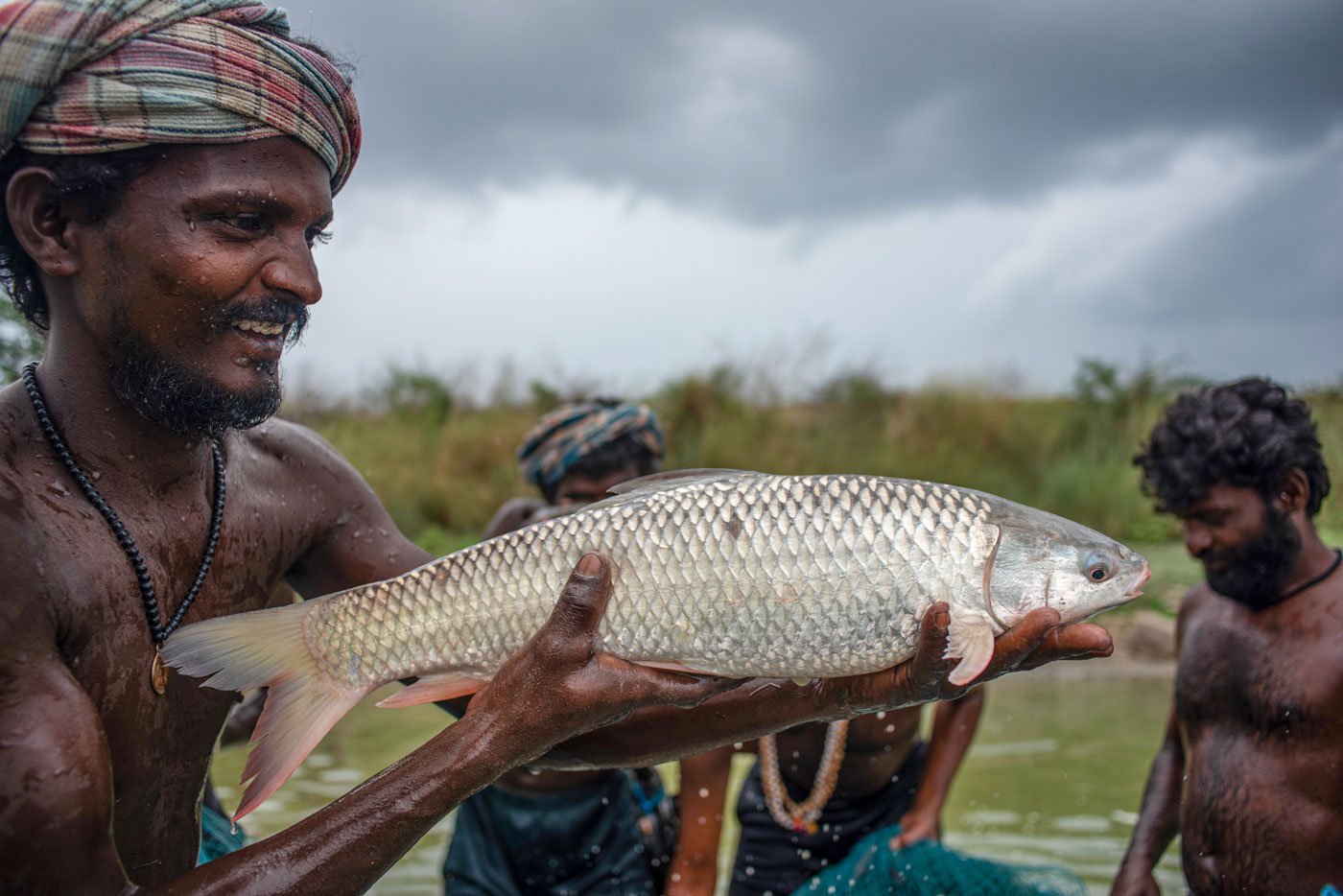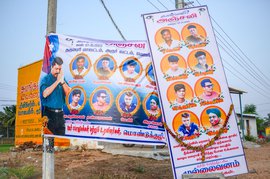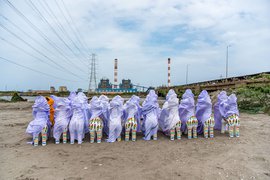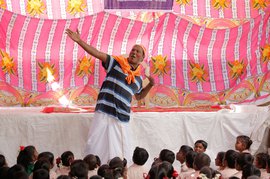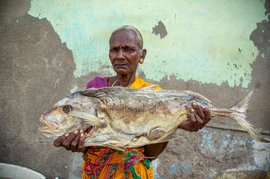My mother would often say to me, “Kumar, if I hadn’t picked up that fish pot, we wouldn’t have come this far.” It was the year after I was born that she began selling fish, and from then on, my life would always be filled with fish.
The smell of fish ran through our house. A sack of dried fish always hung in a corner. The first rains would bring in carp fish which amma [mother] would cook. It is a tasty dish and helps to fight off a cold. When amma makes a curry with catfish, spotted snakehead or selappi , a delicious aroma fills the entire house.
As a child, I would often skip school to catch fish. Those were the days when there was water everywhere – in Jawaharlalpuram area in Madurai – we had wells, rivers, lakes and ponds all across the district. I would go along with my grandfather from pond to pond. We carried a swing basket with which we lifted the water and caught fish. We would also go to the stream and use bait.
Amma would scare us with ghost stories so we wouldn’t go to the stream, but water was always flowing through lakes, and we were always around water. I fished with other boys in the village. The year I passed Class 10, water became scarce, levels in lakes fell and agriculture was also affected.
Our village, Jawaharlalpuram had three lakes – a big lake, a small lake and Maruthankulam lake. The big lake and the small lake near my home were auctioned and given on lease to people in the village. They would breed fish in it and that was their livelihood. The fish would be harvested around both lakes in the month of Thai (mid-January to mid-February) – it is considered the fishing season.
When my father went to buy fish from lakes, I would tag along with him. The cycle had a storage box tied behind and we would travel to many villages, sometimes as far as 20-30 kilometres to buy fish.
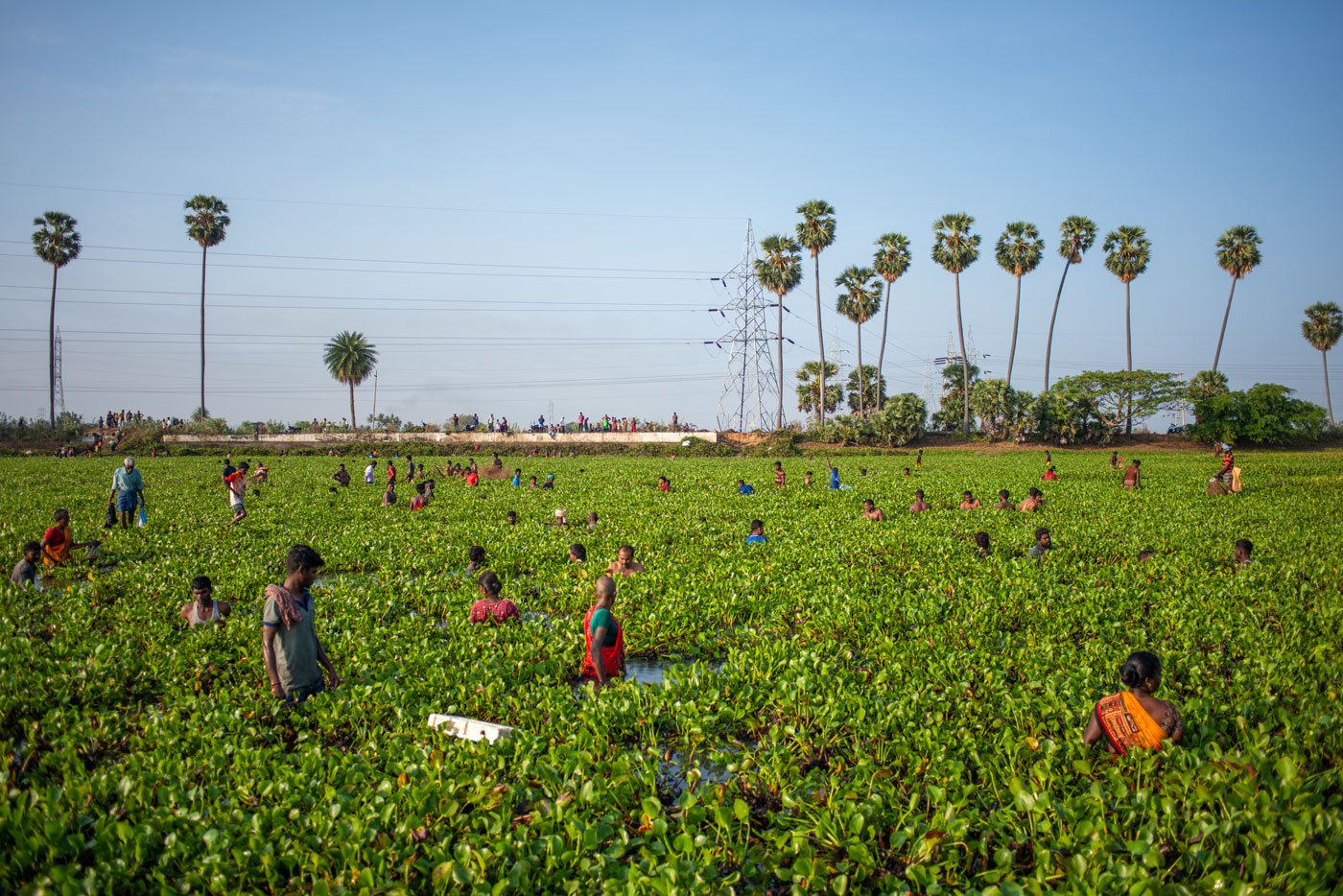
Villagers scouring the lake as part of the fish harvesting festival celebrations held in March in Madurai district’s Kallandhiri village
Fish harvesting festivals are held in many lakes in the Madurai district and people from adjoining villages visit the lake to catch fish. They pray for good rains, a good harvest and for everyone to be happy. People believe that catching fish brings good rains, and if the fish harvest festival is not held, there will be drought.
Amma always said that during the harvest, the weight of the fish would be at its highest and that meant good profits. People often prefer live fish. In the off-season, the weight of the fish is less and there is not enough catch.
Selling fish helped many women in our village survive; it gave a livelihood to the women who had lost their husbands.
Fish turned me into a good photographer. When I purchased a camera in 2013, I would take it along when I went to buy fish. Sometimes I would forget buying fish and end up taking photographs of fishing instead. I would forget everything until the phone would ring with amma ’ s call chiding me for the delay. She would remind me of the people waiting to buy fish from her and then I would run to get it.
The lake didn’t have only human beings. There were birds and cattle alongside the lakes. I bought a tele lens and started taking photographs of the aquatic wildlife – cranes, ducks, small birds. It gave me immense joy to see the birds and take their photos.
These days, there are no rains and no water in the lakes. And no fish.
*****
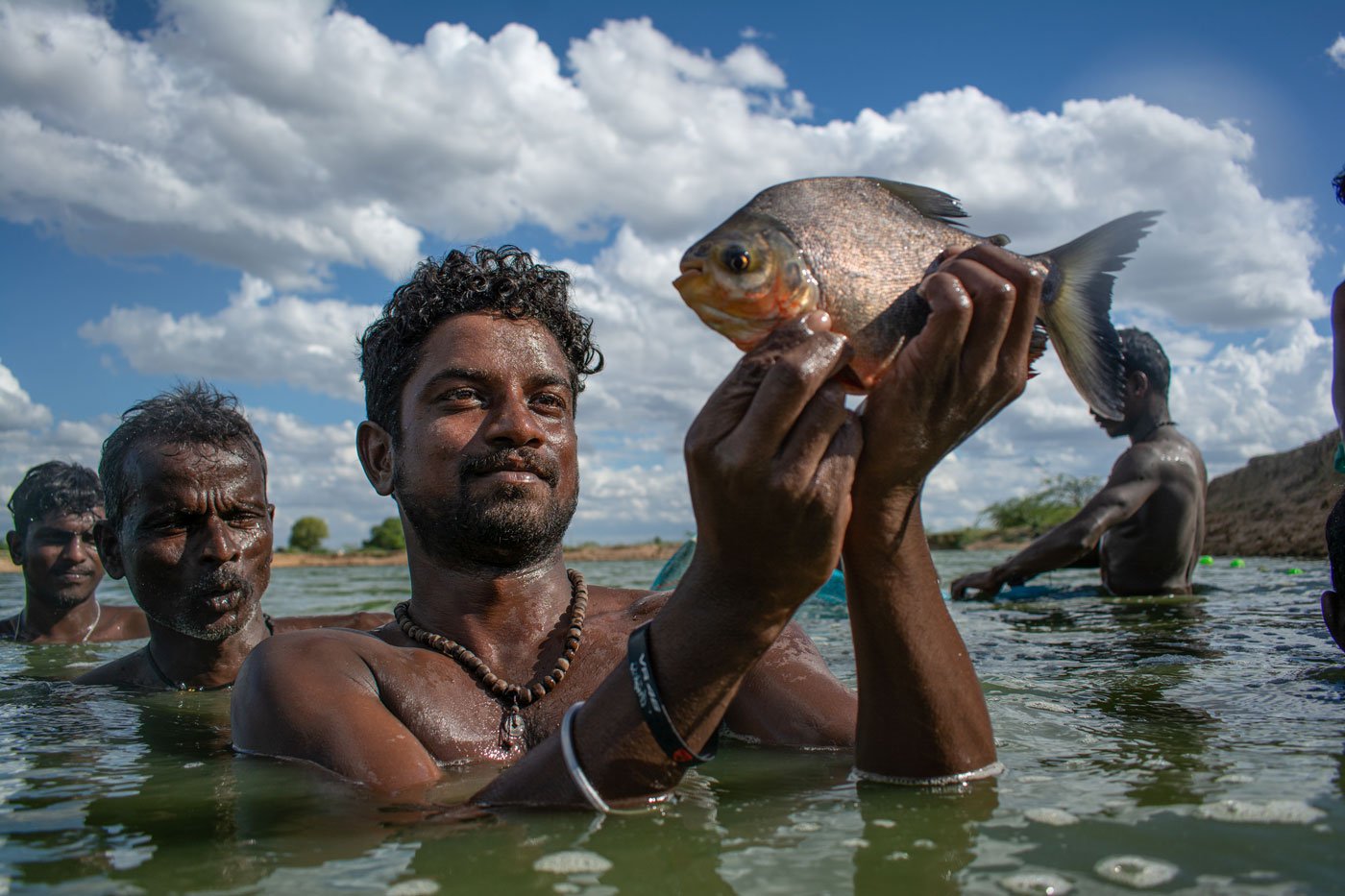
Senthil Kalai shows his catch of kamma paarai fish. He enjoys posing for pictures
When I got my camera, I also began taking photographs of fishermen – Pichai anna, Mokka anna, Karthik, Marudhu, Senthil Kalai – who threw their nets in the lakes. I learnt a lot when I threw the net along with them and caught fish. All of them are from a hamlet near Pudupatti village in Madurai East block. In this village of roughly 600 persons, a majority 500 are into fishing and it is their primary livelihood.
C. Pichai is a 60-year-old fisherman, who has travelled far and wide to fish in lakes in Tirunelveli, Rajapalayam, Tenkasi, Karaikudi, Devakottai and other places. He learnt how to fish from his father when he was 10 years old, and would travel around with him to fish, sometimes staying for a few days to build up their catch.
“We fish for six months in a year. We sell fish that we catch over six months and use the remaining fish to make dried fish, so that we get an income round the year,” Pichai told me.
He says native fish are born from the eggs that are buried in the soil and nourished by the rains. “The native fish like keluthi , korava , varaa , pampupidi kendapudi , velichi are not in as great numbers as they used to be. The water is contaminated with pesticides used in fields that leach into lakes. Today all fish are bred, and they are fed artificially which further destroys the fertility of the lakes,” he says.
When Pichai doesn’t have fishing work he takes up daily wage work like building canals under NREGA (National Rural Employment Guarantee Act), locally referred to as noor naal pani , or any work that comes his way.
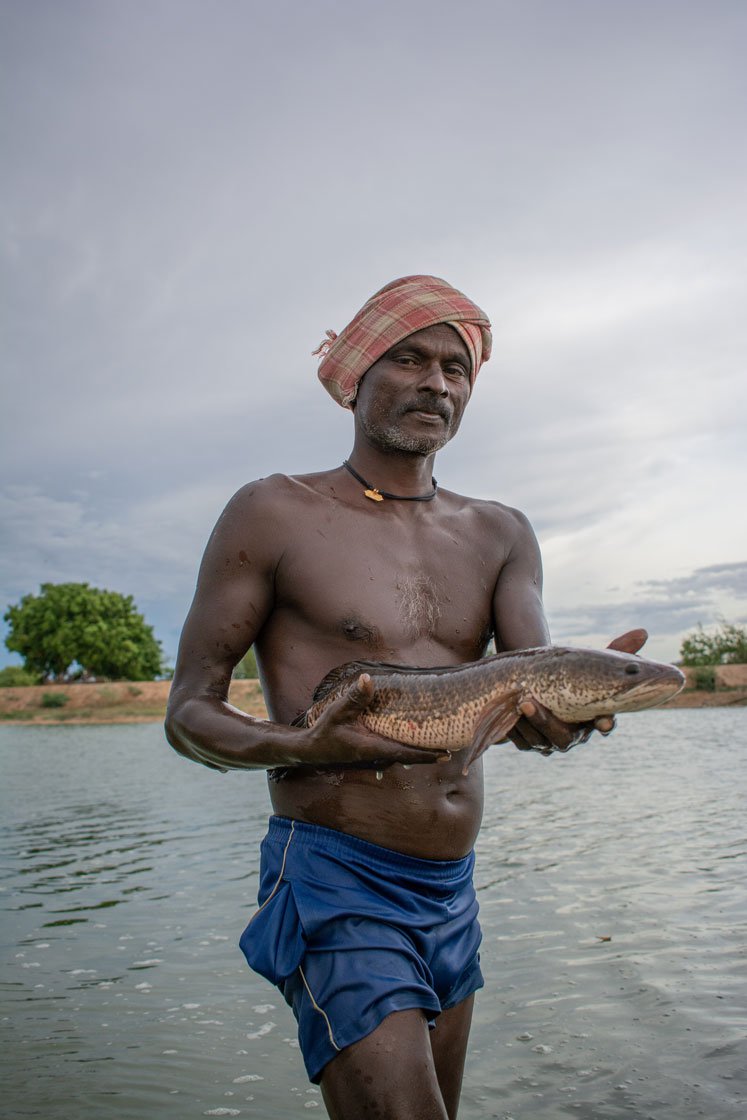
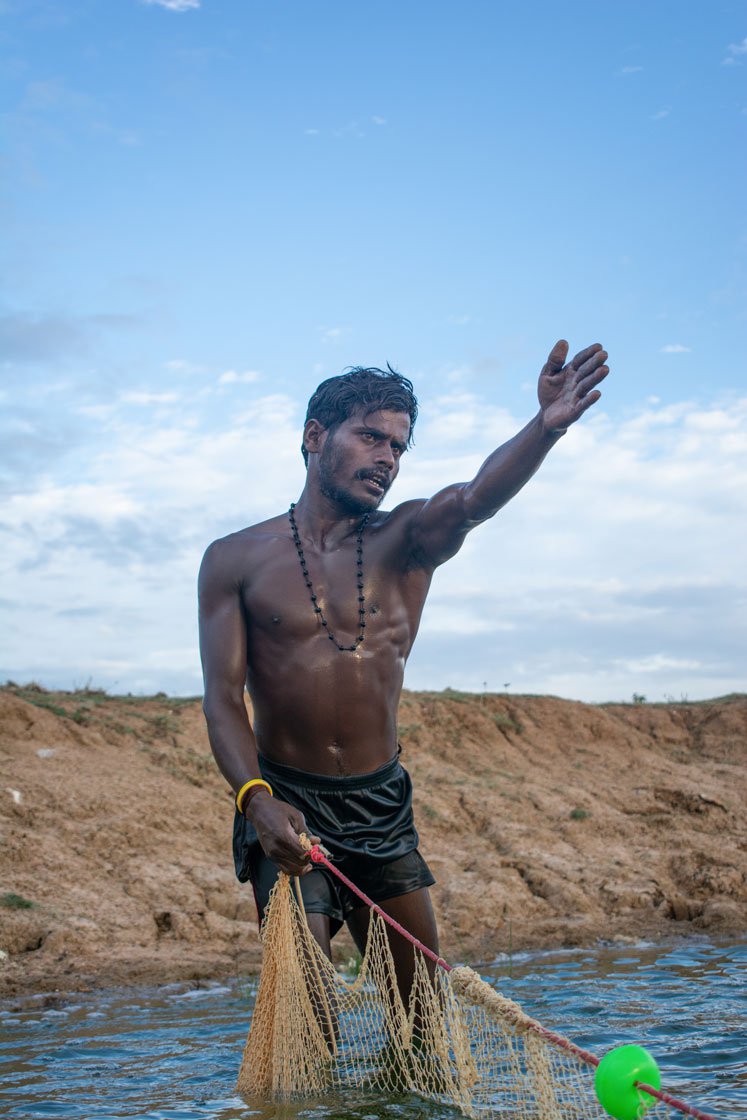
Left: C. Pichai holding a Veraal fish. Right: Mokka, one of the most respected fishermen in Y. Pudupatti hamlet, says that they do not get native varieties like ara , kendai , othai kendai , thar kendai and kalpaasi anymore
Another fisherman, 30-year-old Mokka, says he too must take up daily wage work when the season is over. His wife works as a server in a hotel, and their two children are in Class 3 and Class 2.
Brought up by his grandmother as his mother died young, he says, “I was not interested in studies and started working in the fields and did other menial jobs. But I am keen to get my children educated so that they get good jobs.”
*****
Malkalai makes fishing nets by hand, a skill he learnt from his forefathers. “It is only in our village, Othakadai that we still use handmade nets for fishing. The nets today are very different than what my grandfather used. Then they would take fibre from coconut trees and twist it into a net,” says the 32-year-old. “They would go in search of coco peat [coir] to weave nets which were well regarded in our village. People would carry it with them when they went fishing to other places.
“Fish and fishing are an important part of our lives, and our village has many fishermen. If someone who is an expert fisherman passes away, our village honours his legacy by taking a bamboo stick from his funeral bier and using it as a base for a new net. We continue this practice in our village.
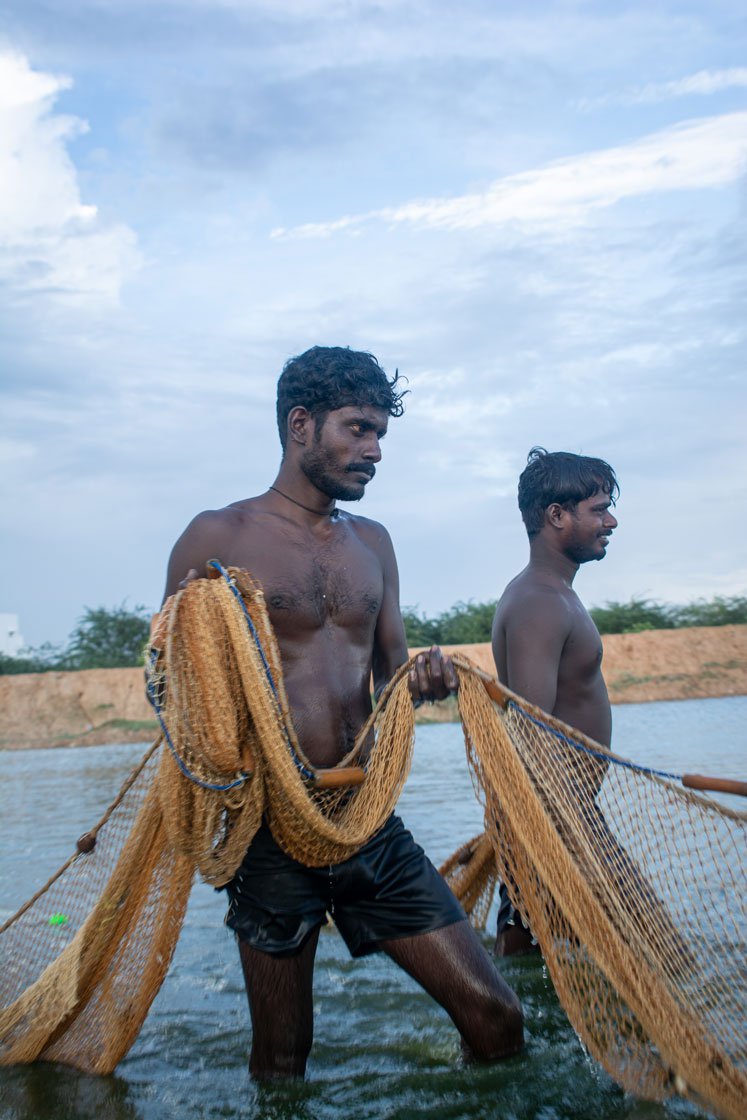
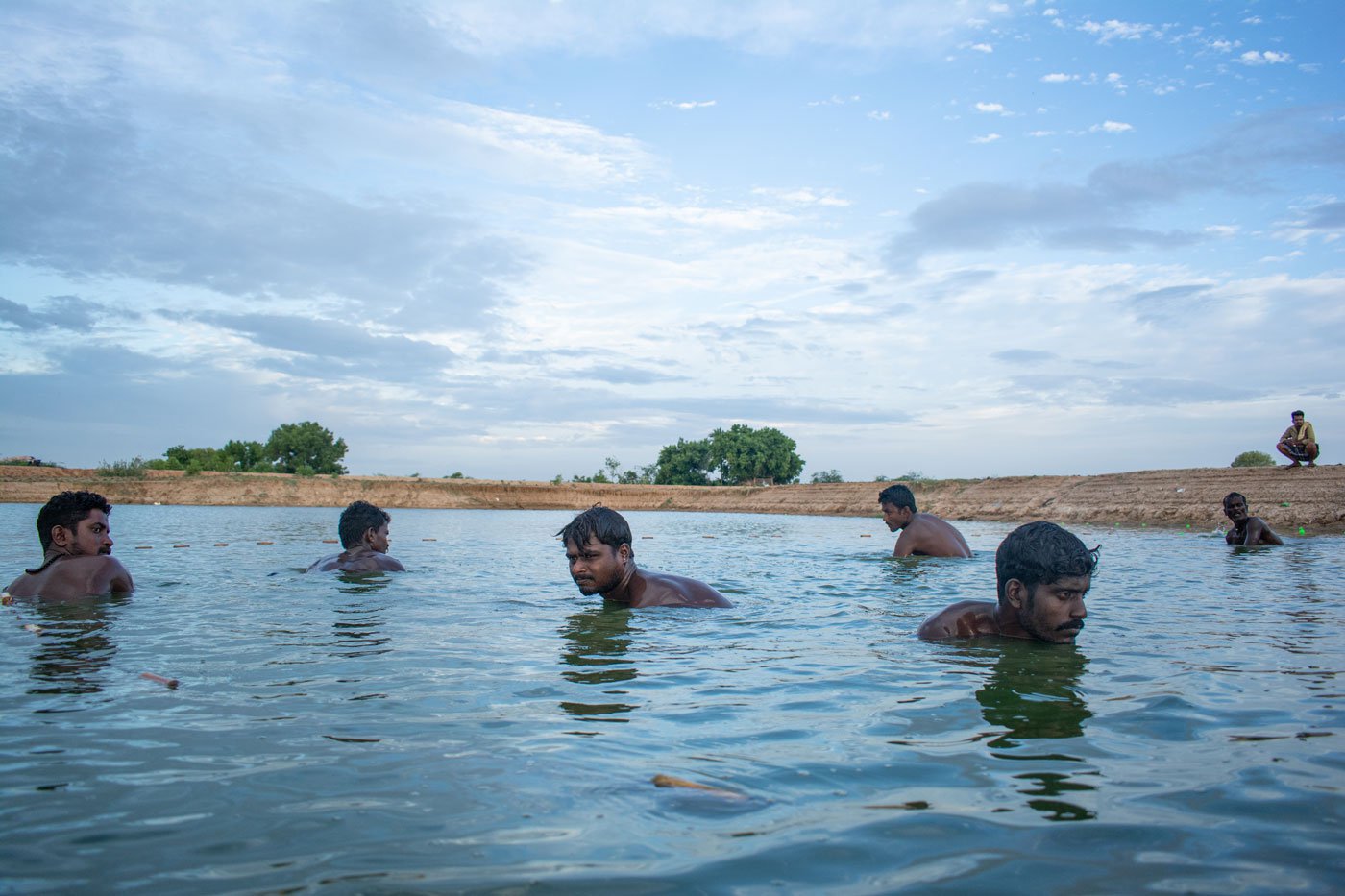
Left: Malkalai (foreground) and Singam hauling nets out of the water. Right: They have to dive into the lake to drag out their nets
“Our people can tell just by looking at the water in a lake what will be the size of fish in it. They take the water in their hands, and if it is turbid, they say the fish will be large; if the water is clear, the number of fish will be less.
“We used to go all around Madurai district to fish – Thondi, Karaikudi, even to Kanyakumari, all the way to the sea [Indian Ocean]. We would visit all the lakes in Tenkasi; we went to dams. Sometimes we caught about five or 10 tonnes of fish, but our wages remained the same no matter what the size of our catch.
“Madurai once had almost 200 lakes, but with rapid urbanisation, the lakes are disappearing. That is why we are forced to travel to other places for fishing. As lakes disappear, the lives of people like us – fishermen by traditional – is badly affected. Fish traders are also affected.
“My father had three siblings and I have three siblings. All of us are into fishing. I am married and have three daughters, and a son. The youth in our village now go to schools and colleges but they are still interested in fishing. After their school or college hours, they spend their time fishing.”
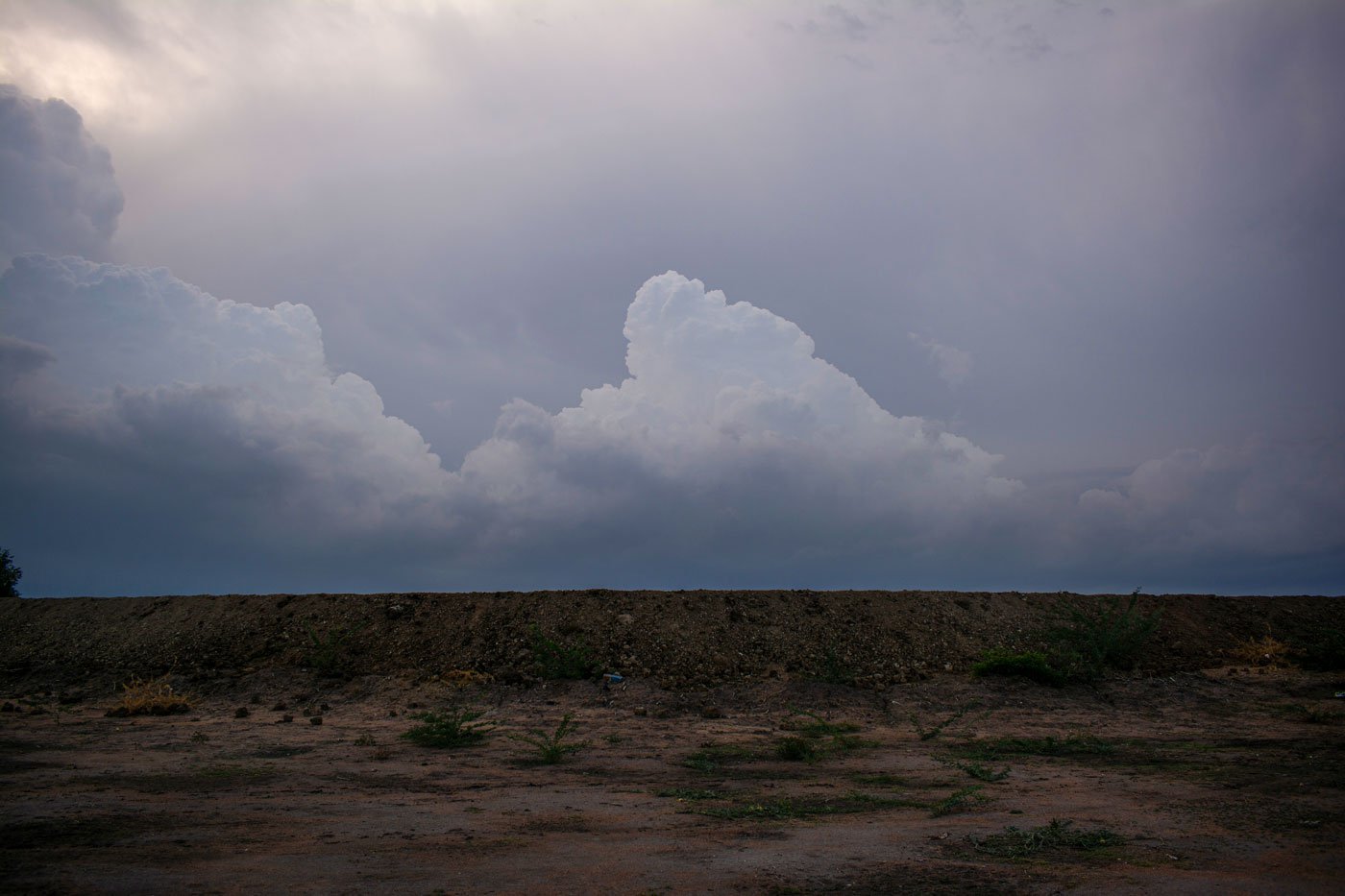
The shore of chinna kamma (small lake) in Jawaharlalpuram area in Madurai where the writer would walk to buy fish from the lake
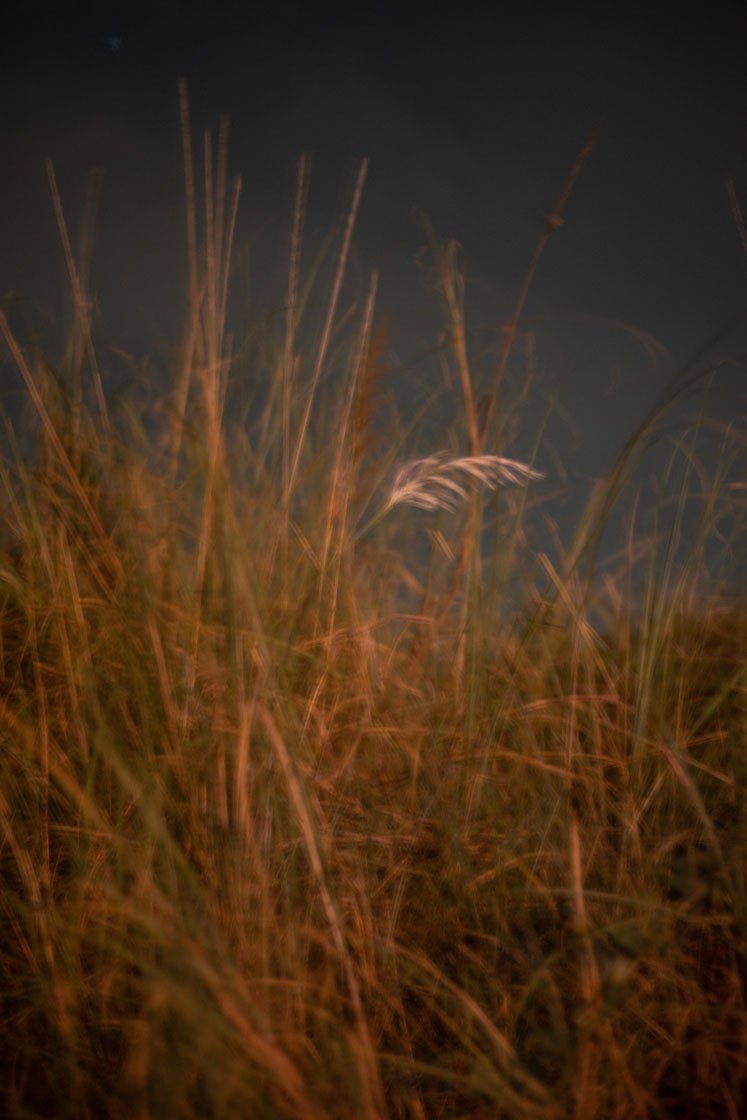
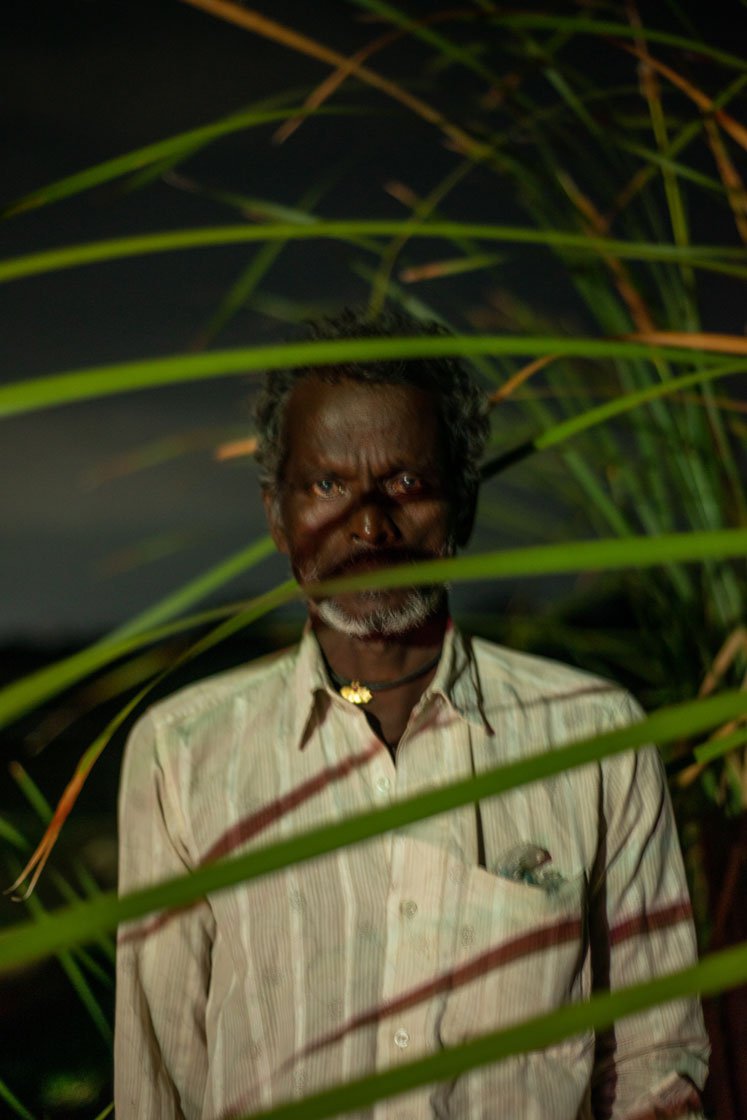
Left: Local fishermen say that lakes come alive when water is let out from the dam. Right: C.Pichai from Y.Pudupatti village is well-known for his nuanced skills in this difficult craft
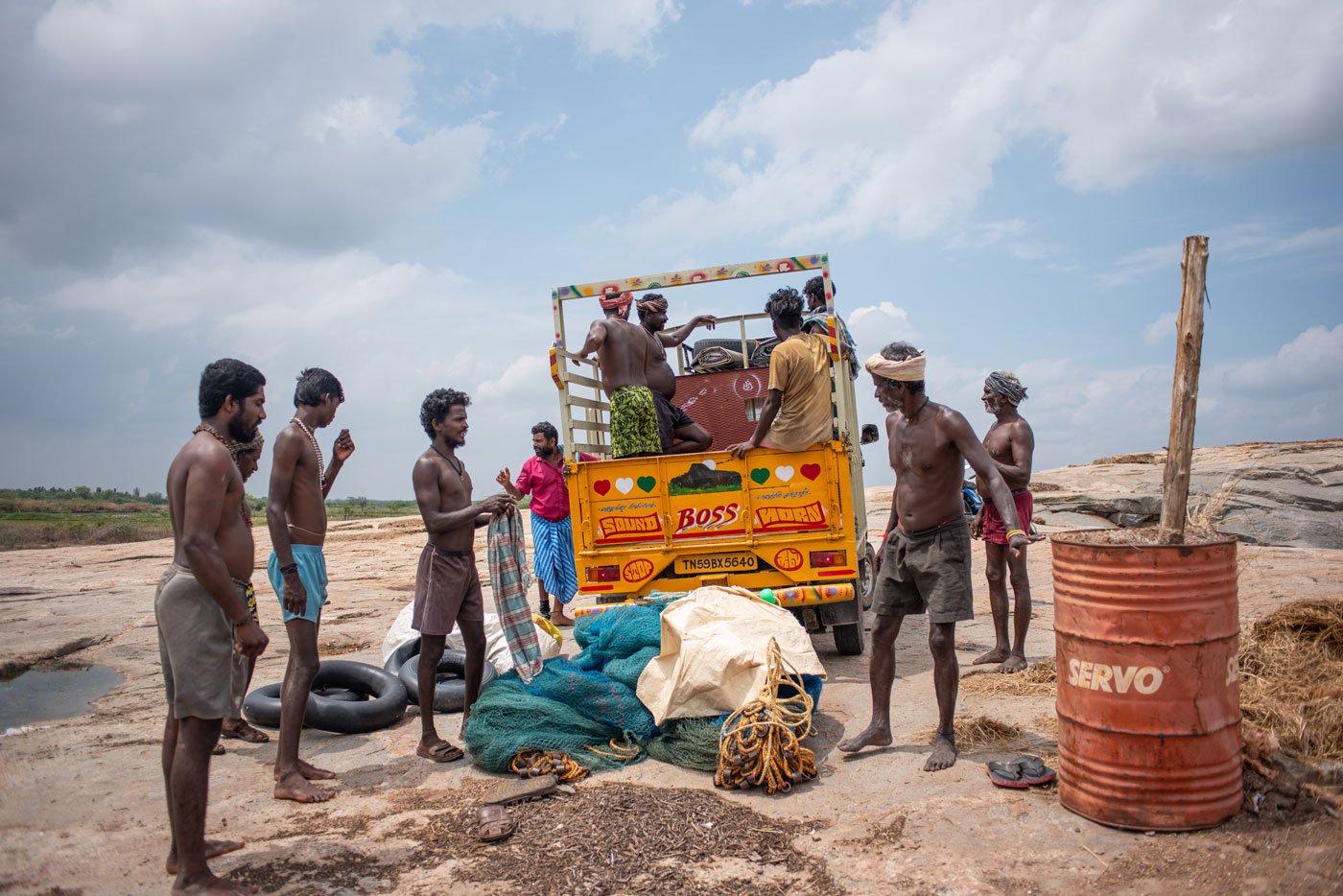
Fishermen readying for action at the lake in Kunnathur, north Madurai. They have rented a mini truck to carry all the equipment they require
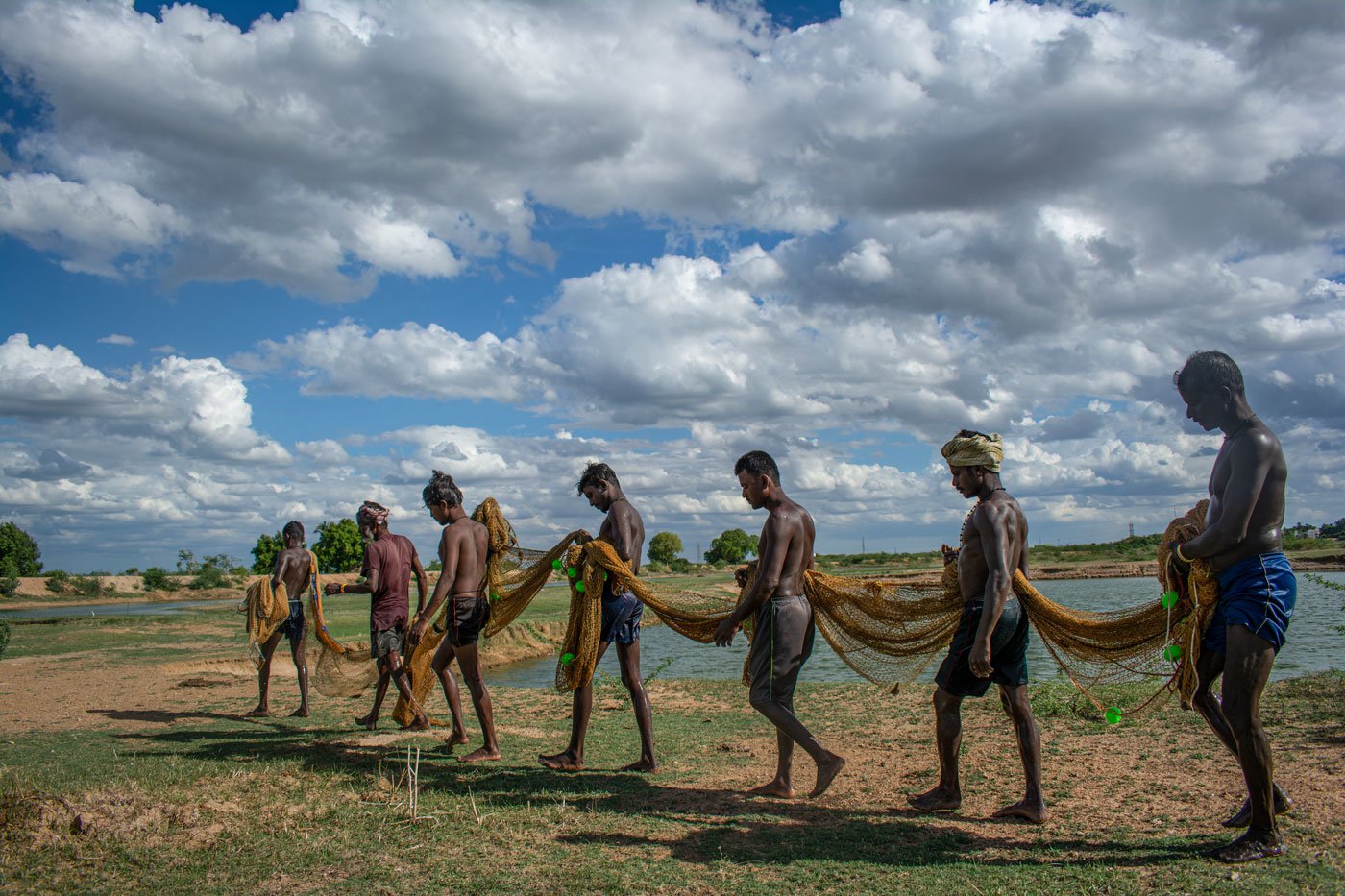
Fishermen move around the big lake in Jawaharlalpuram in Madurai to increase the catch
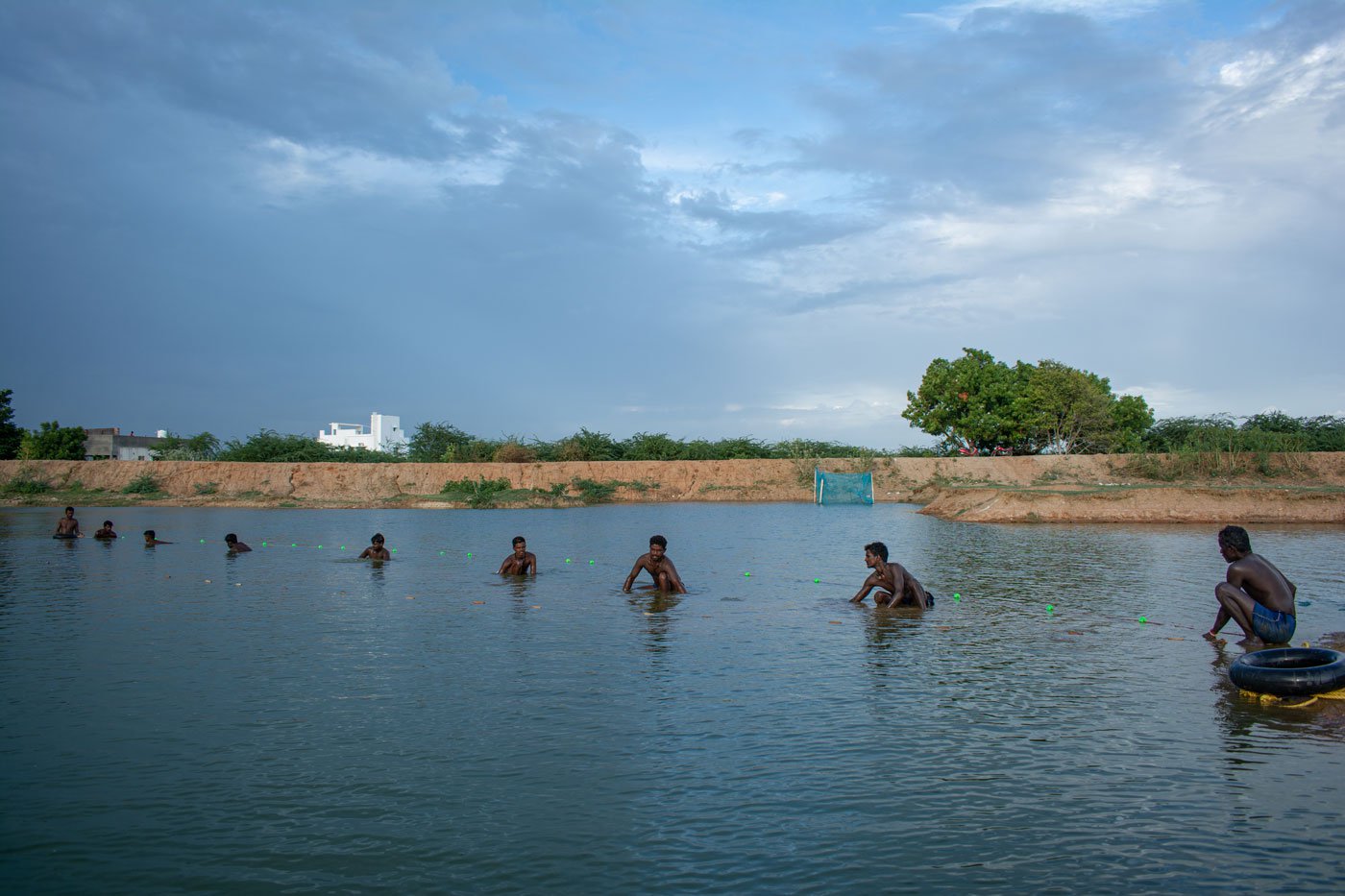
They cast their fishing nets and get into the deeper end of the lake
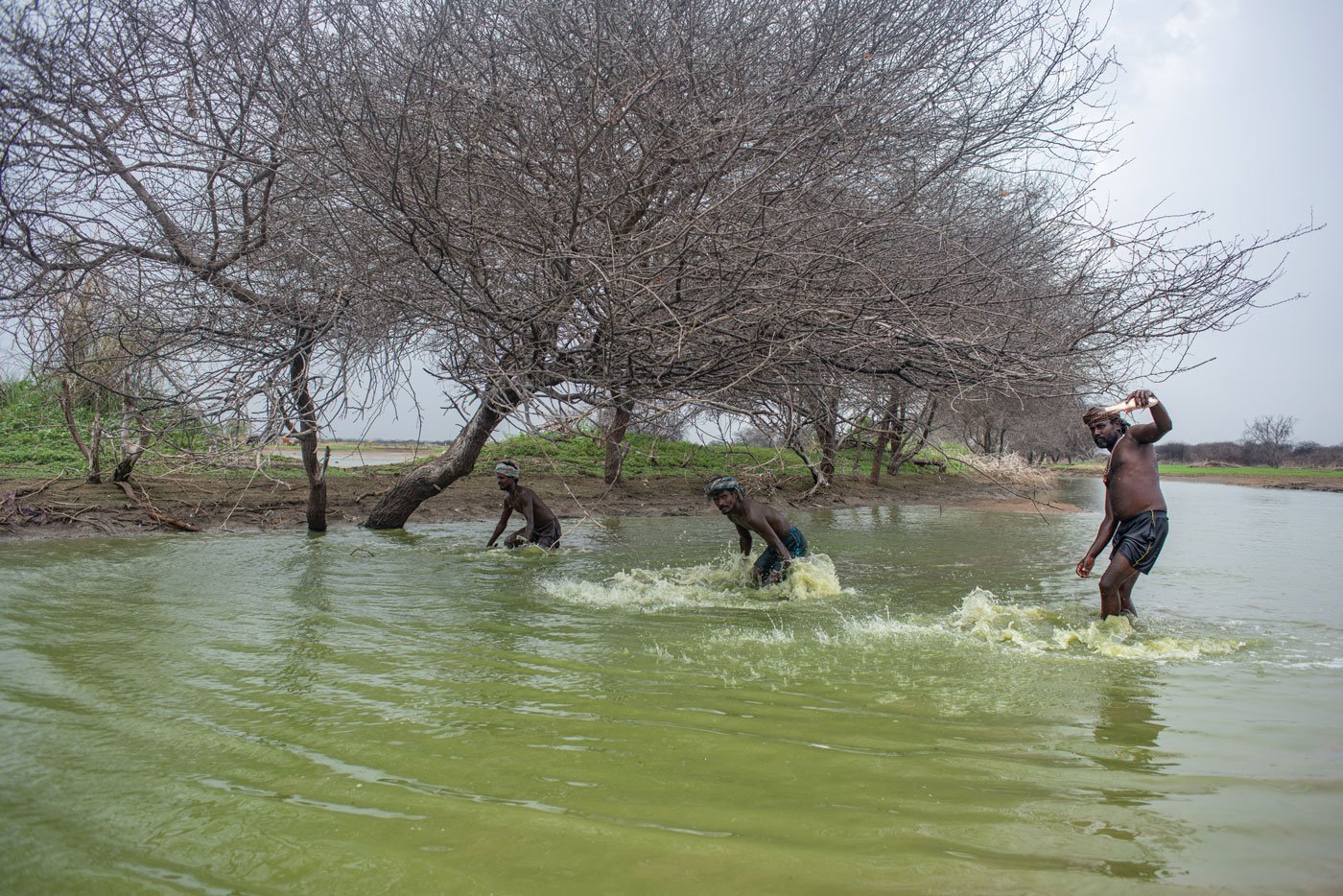
Fishermen agitate the deeper waters in an attempt to trap more catch
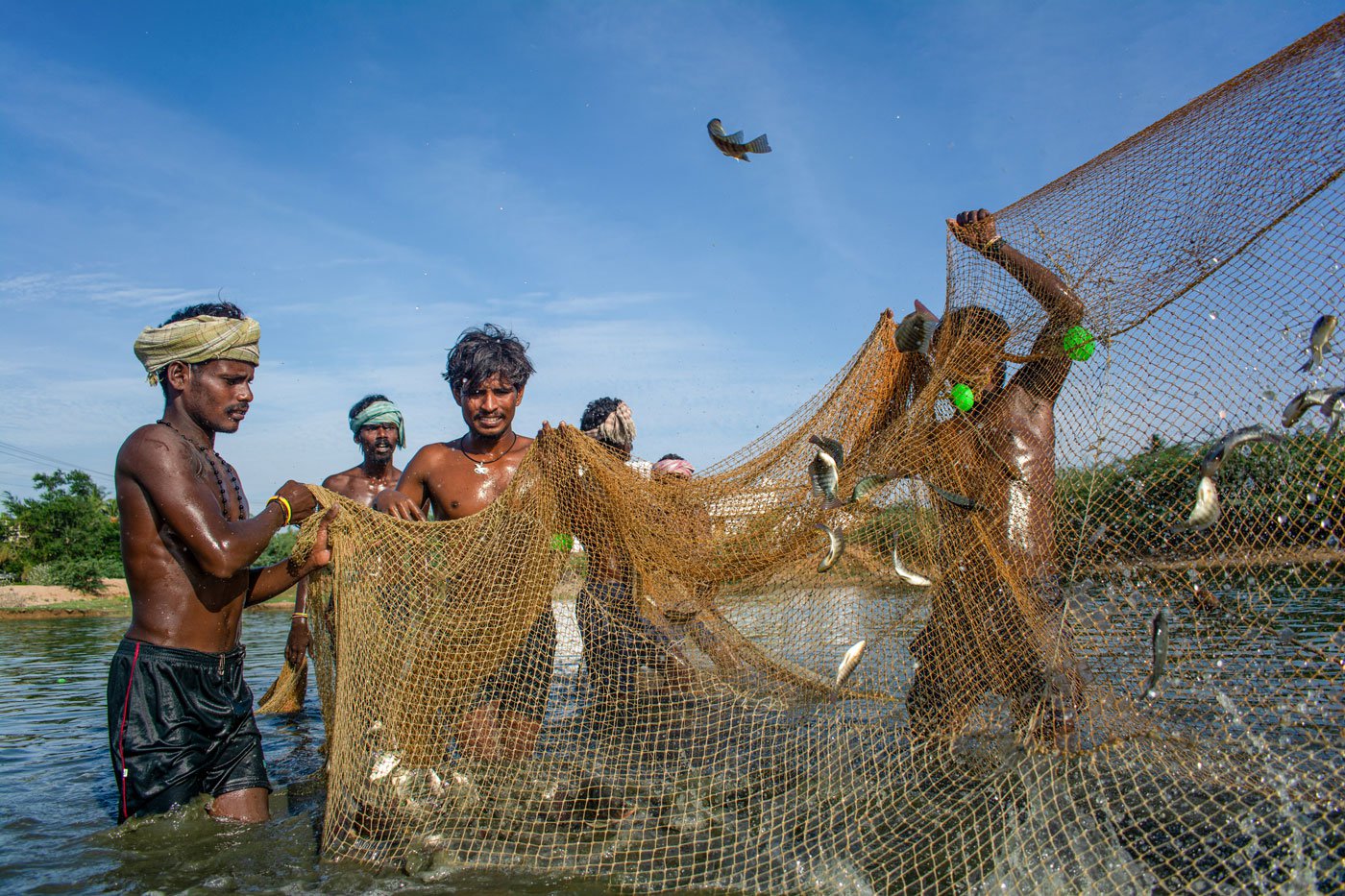
Fishermen hauling nets out of water in the big lake in Jawaharlalpuram. Mokka (extreme left), says there are stones and thorns in the lake bed. 'If pricked by a thorn, we won't be able to even walk properly so we have to be very careful when throwing the nets'
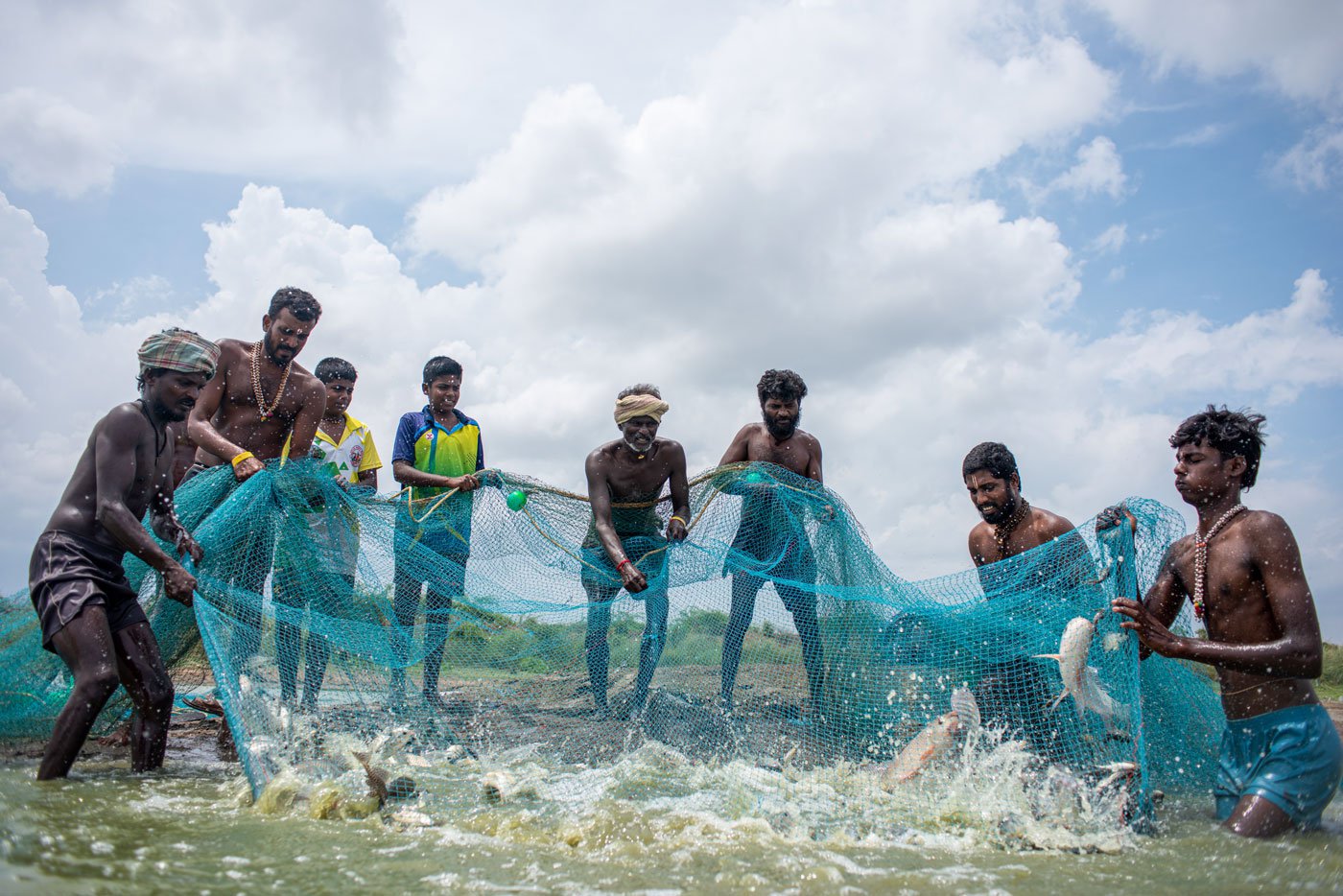
They drag the net towards the shore in the small lake in Kunnathur
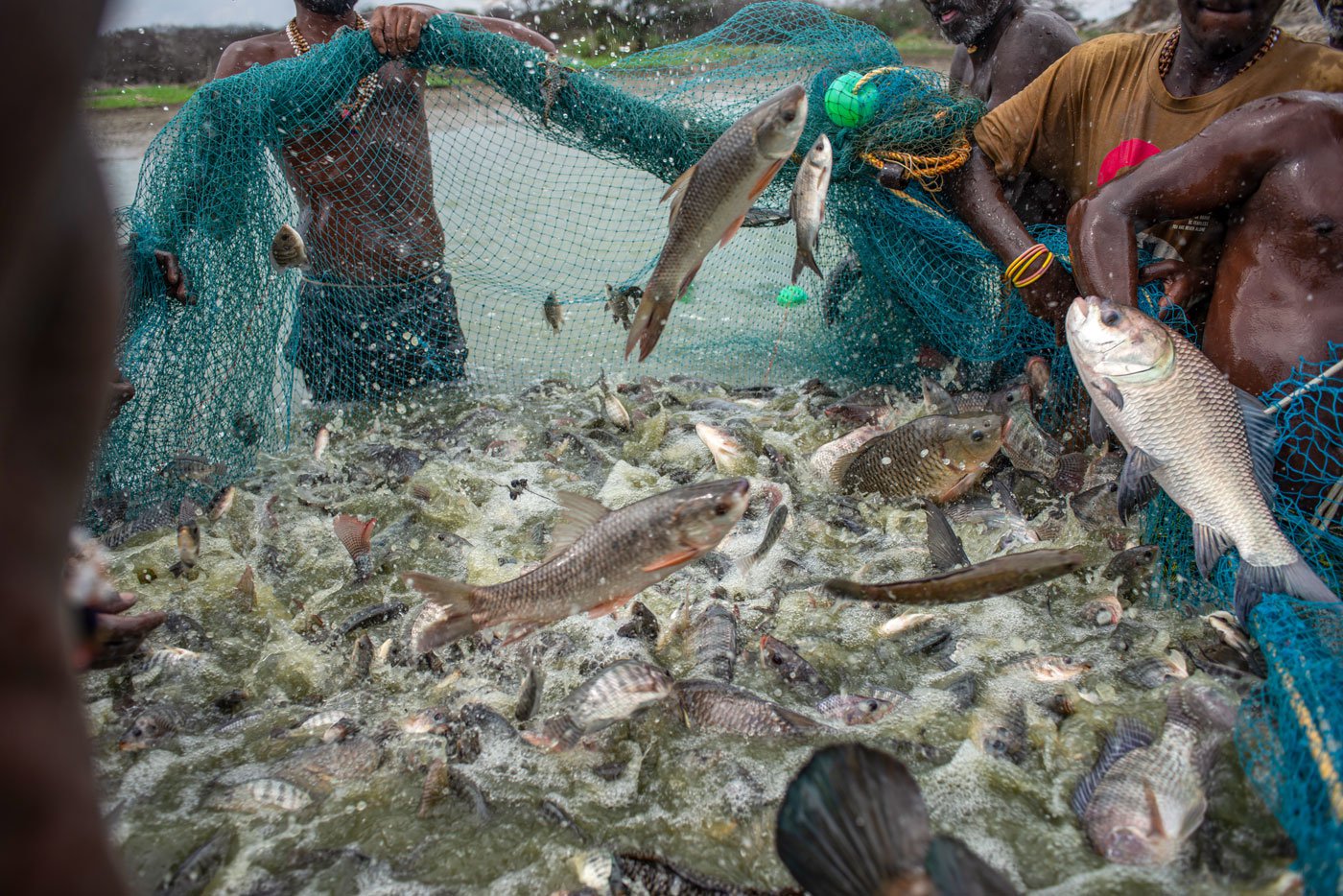
They move their catch towards shallow waters where temporary structures have been built to collect and store fish
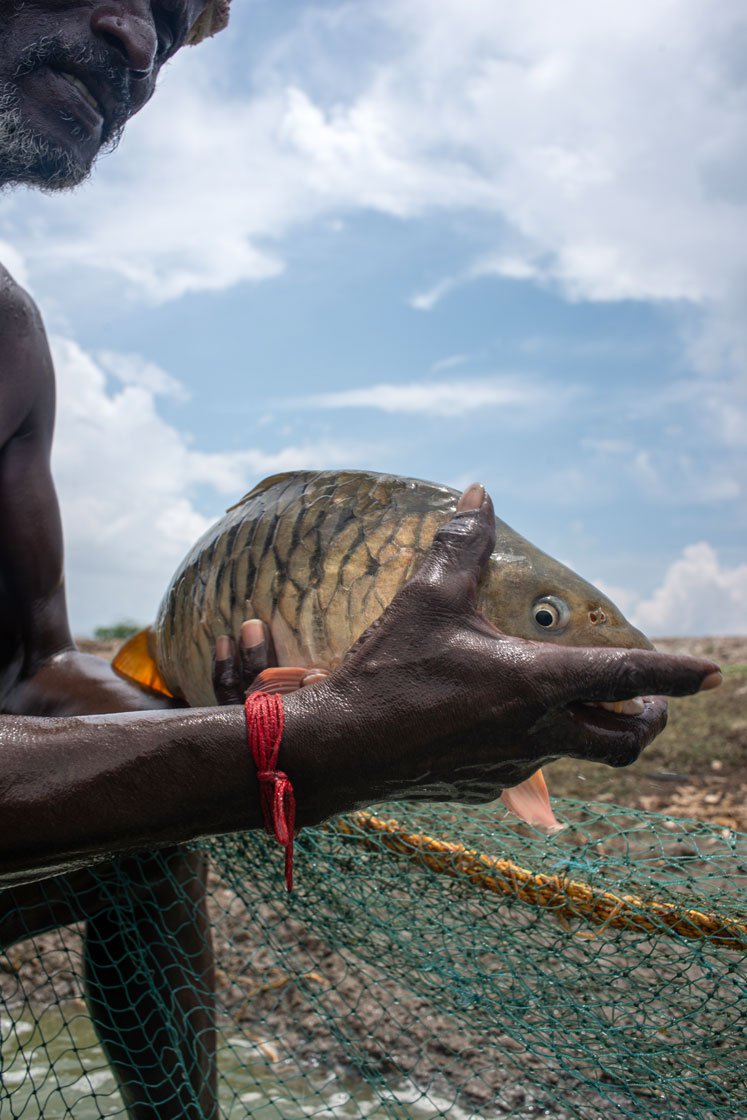
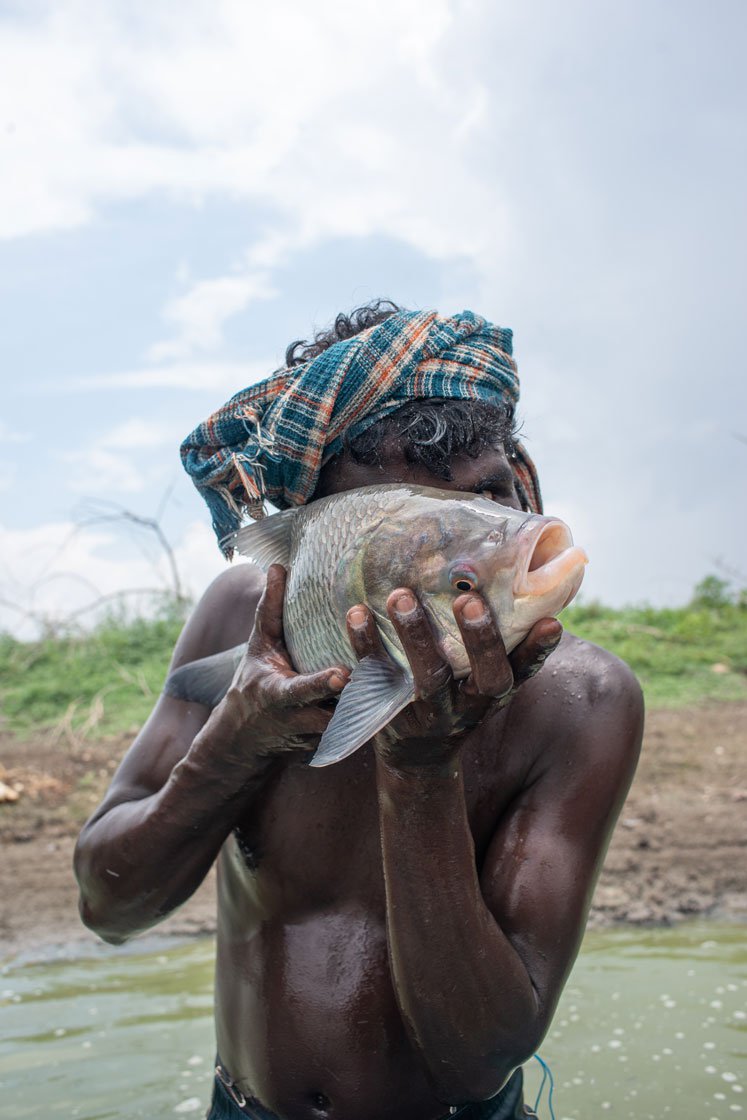
That’s a
kanadi katla
variety in C. Pichai’s hands (left). Raman (right) shows off his catch of a
katla
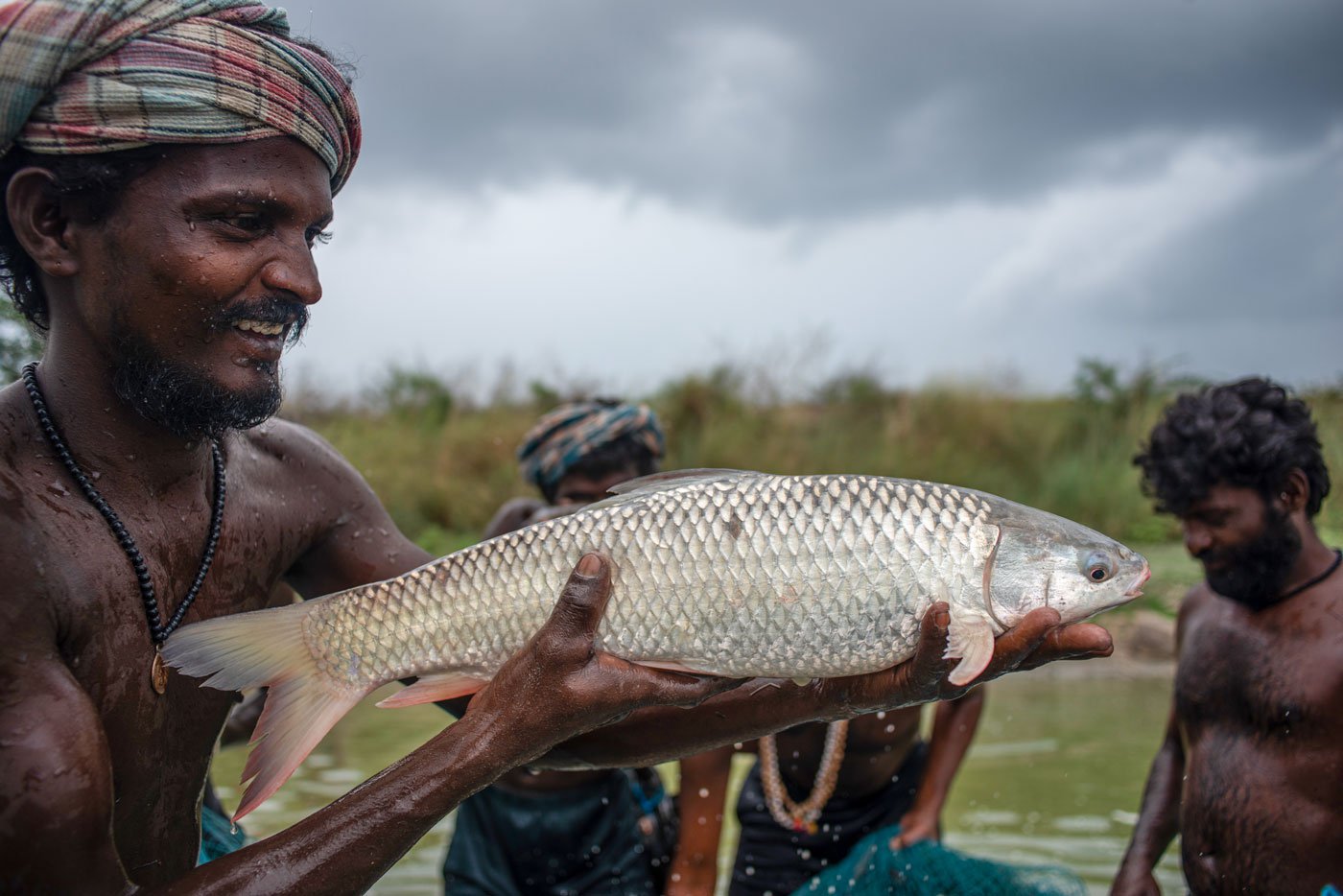
M. Marudhu holding the mullu rohu kenda fish in his hand
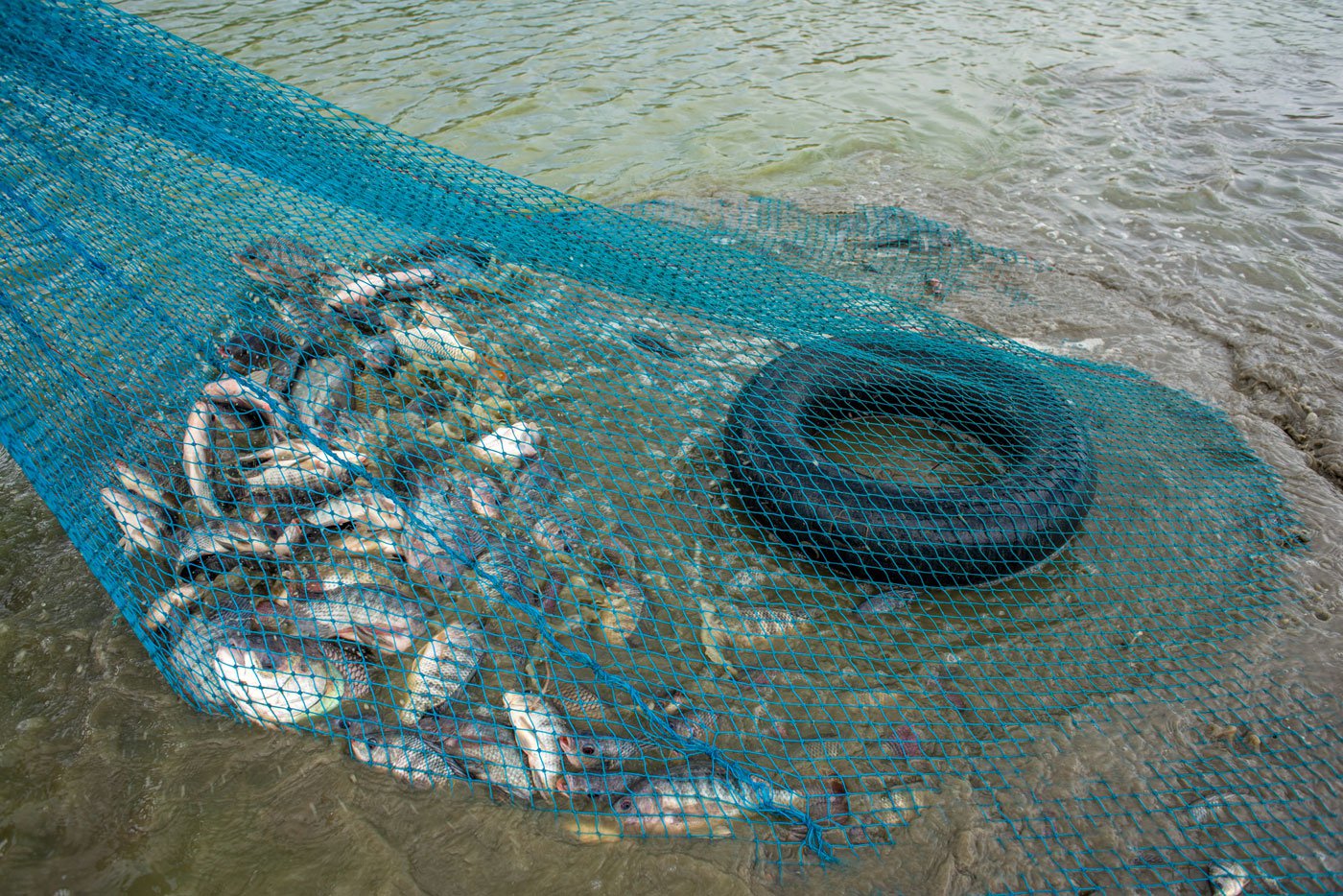
Fish caught during the day are stored in a temporary structure called ' aapa' to keep the catch fresh until evening when it will be taken and sold at the market
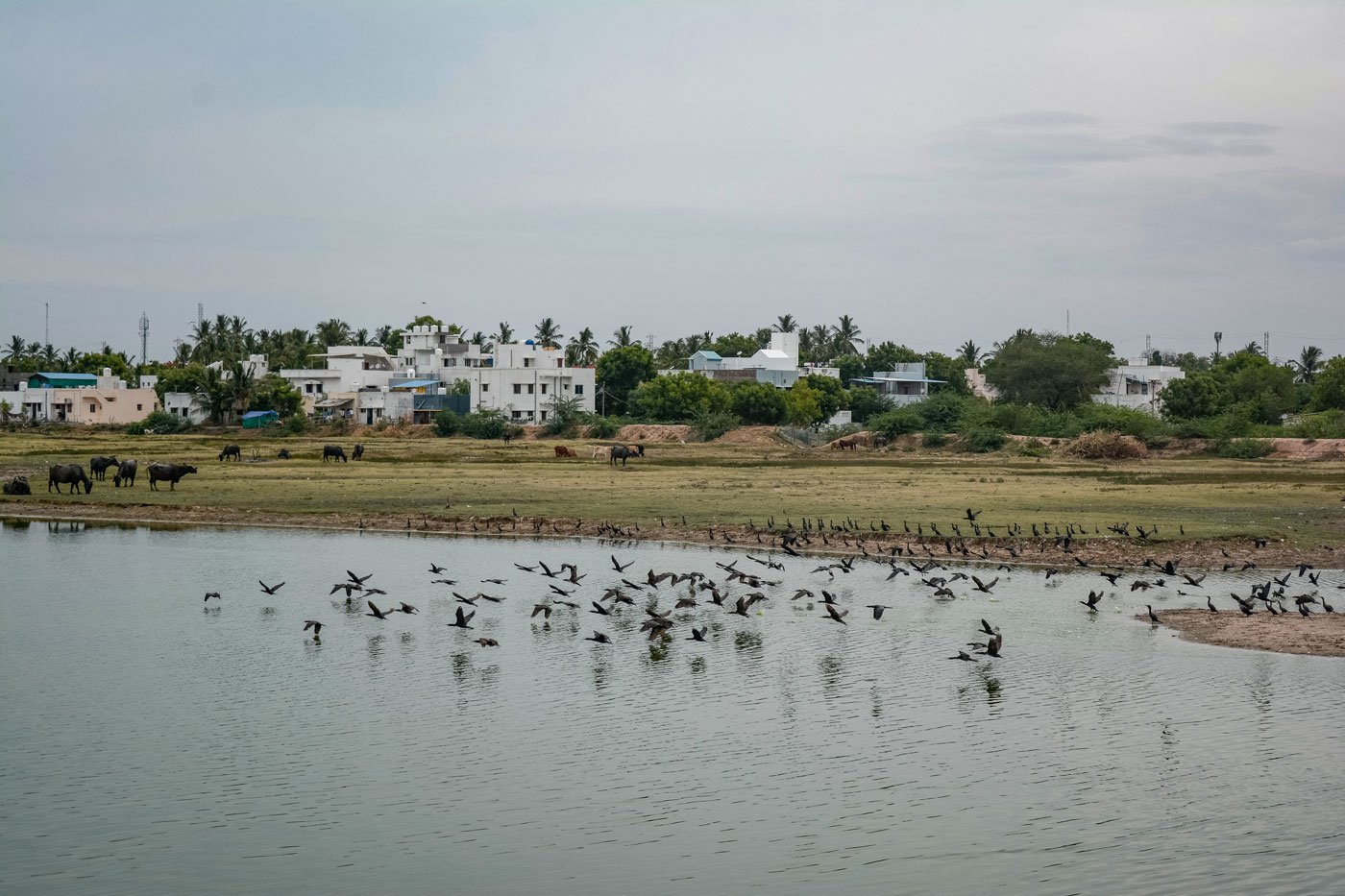
Neer kaagam (cormorant) is one of the most commonly sighted birds in the big lake in Jawaharlalpuram
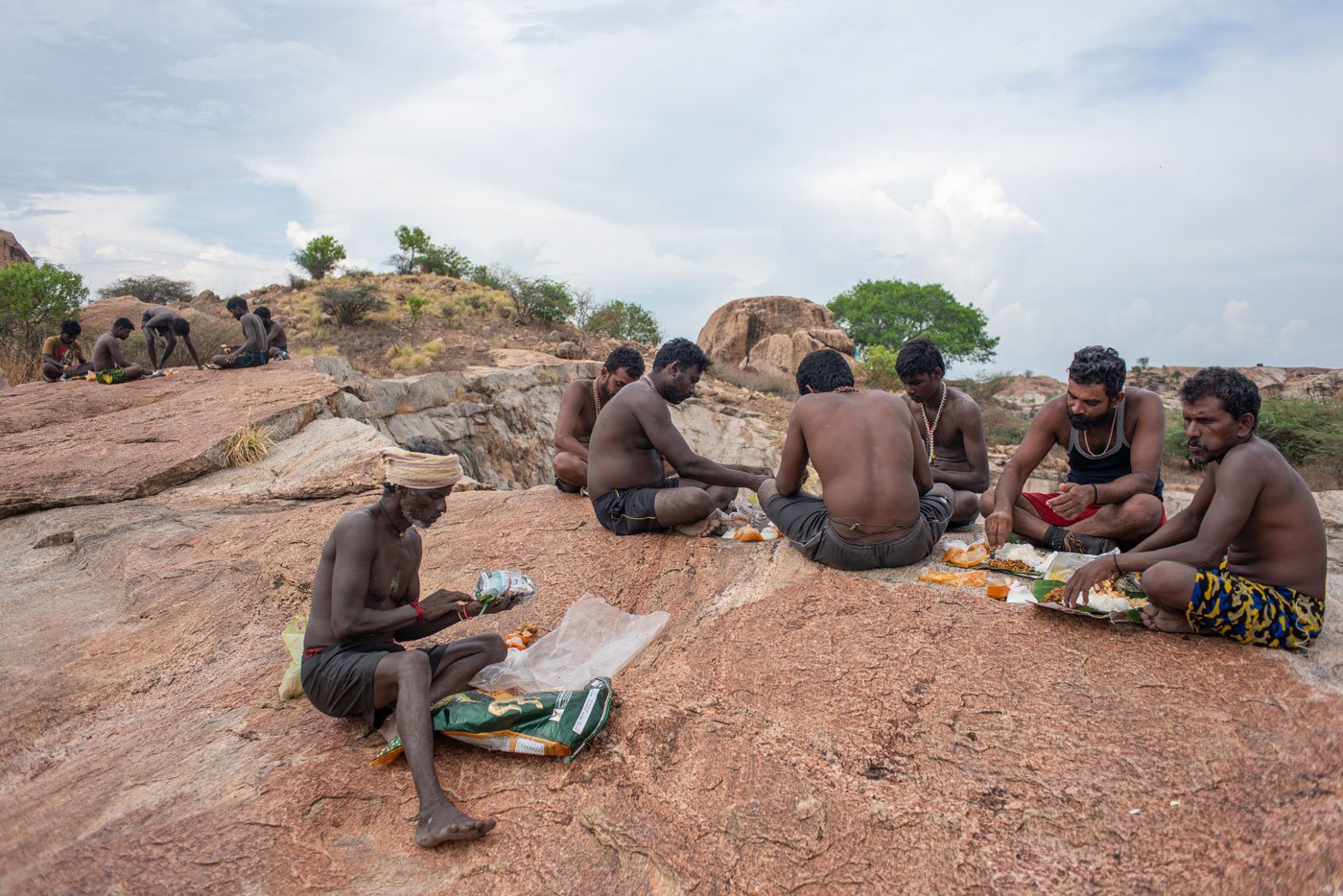
Fishermen eating lunch as they sit on a hillock near Kunnathur lake
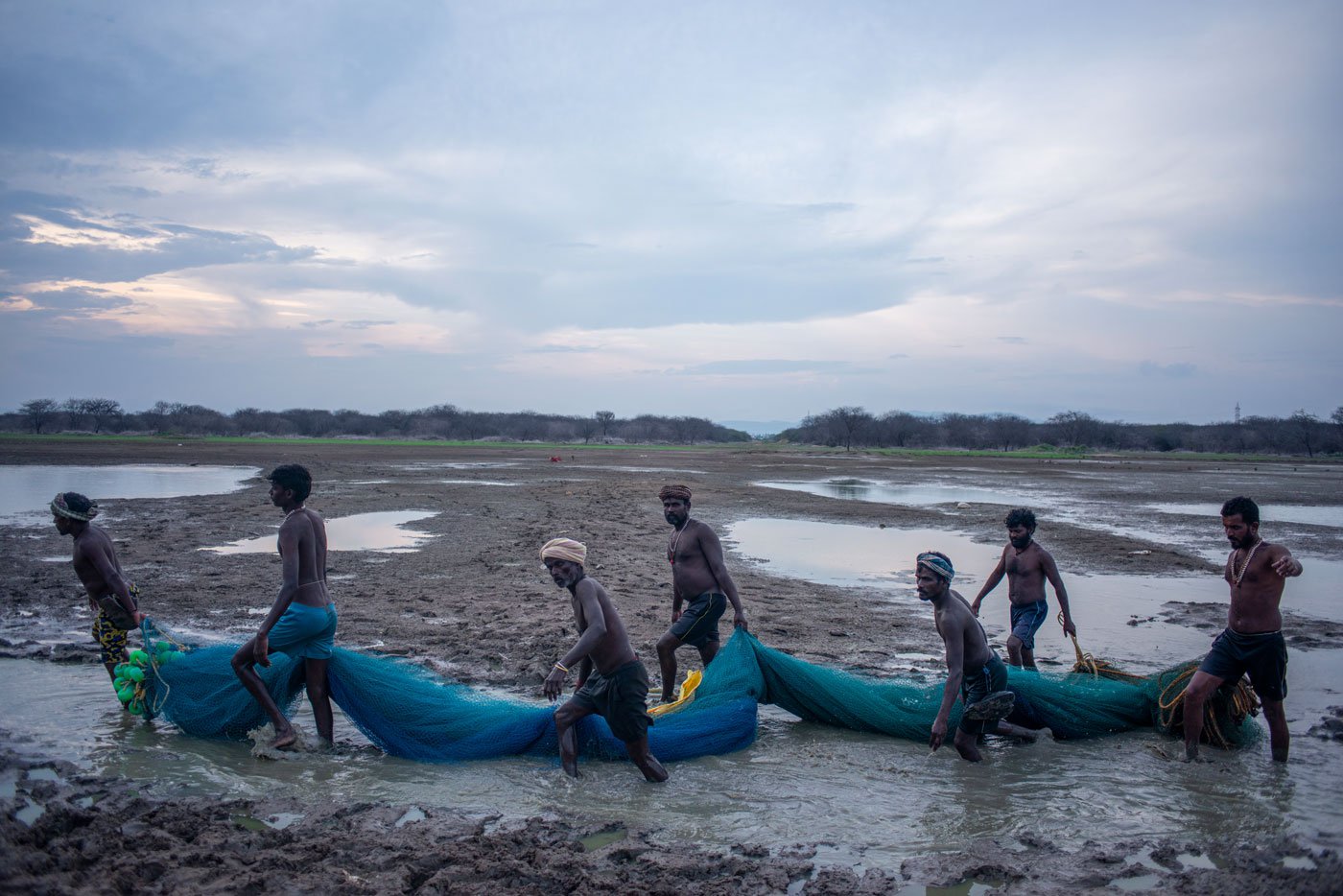
As the fishermen head home, they tie their nets together into a bundle to make it easier for them to carry
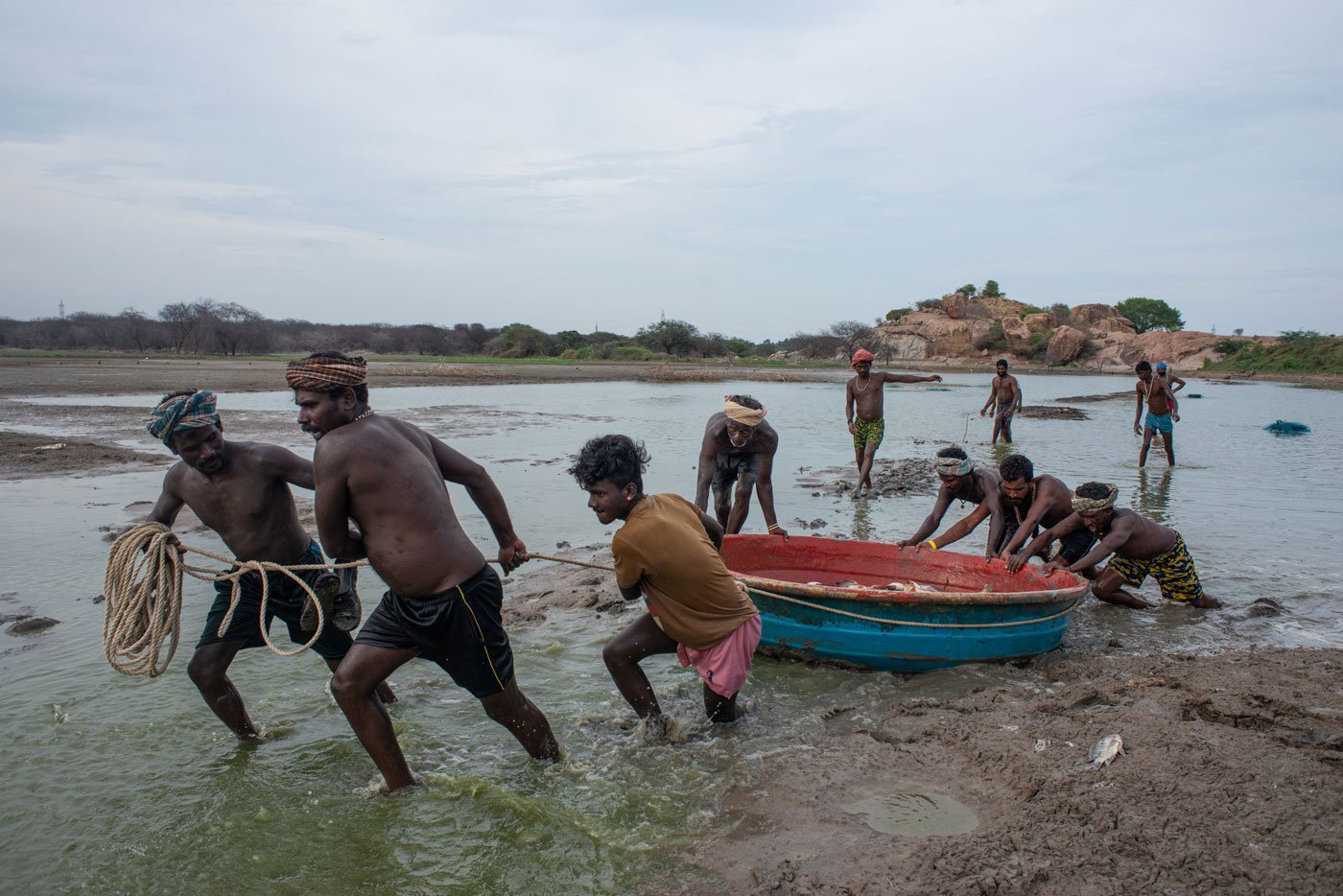
Fishermen pushing their coracle towards the shore; it is heavy and loaded with their catch
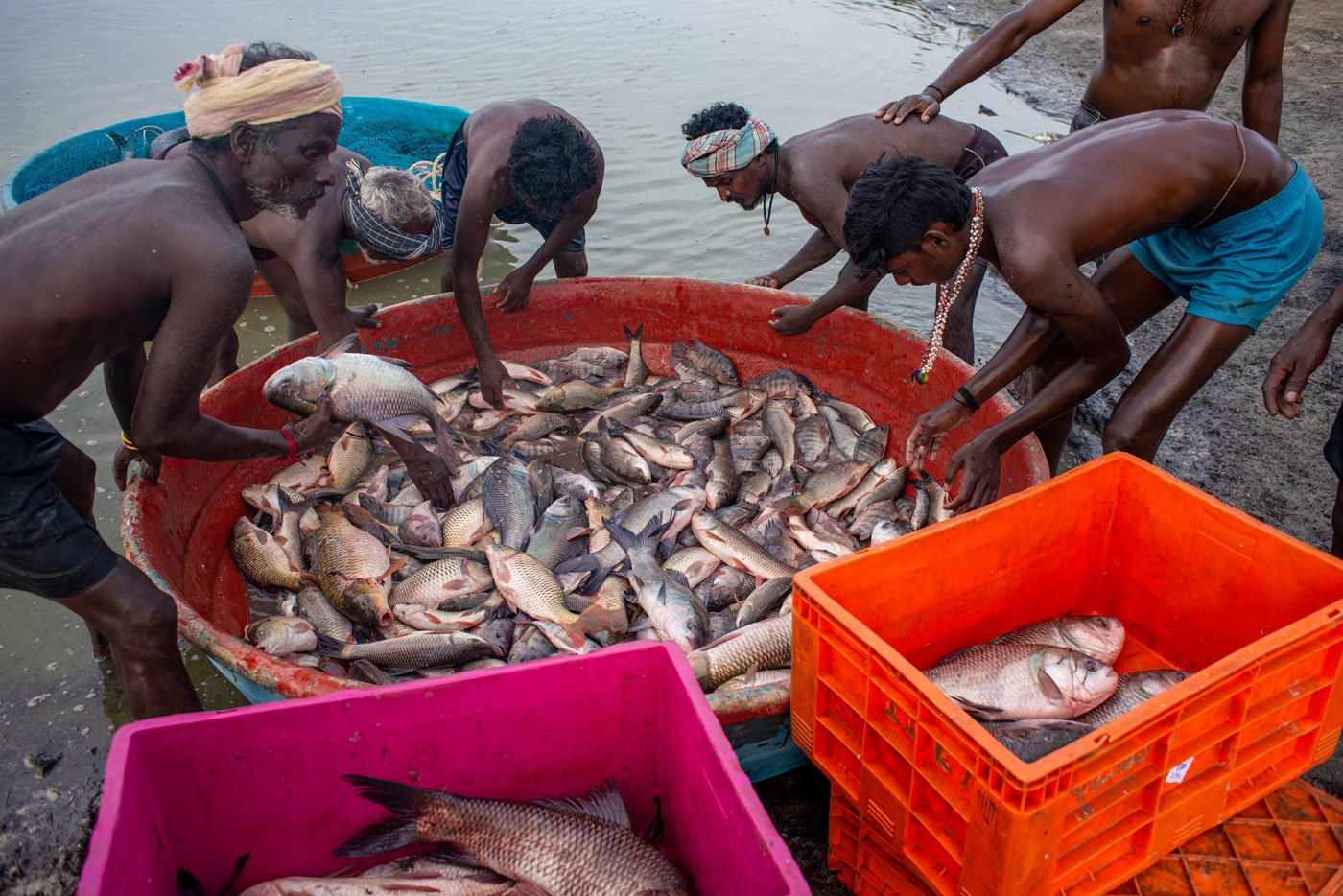
They are transferring their catch from coracle to ice box to be transported for sale in other districts
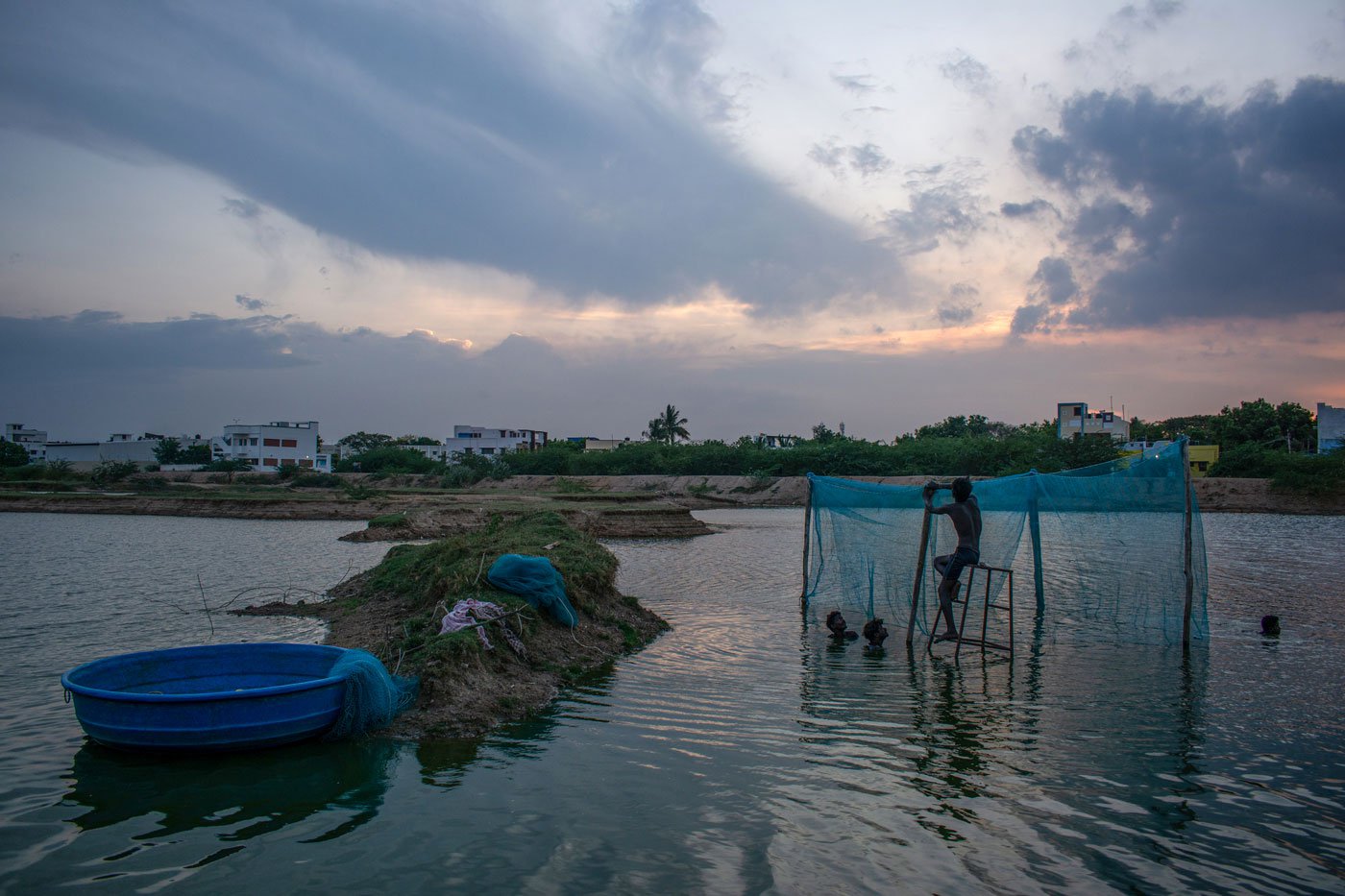
Madurai once had almost 200 lakes but with rapid urbanisation, these water bodies on which so many livelihoods once depended, are vanishing
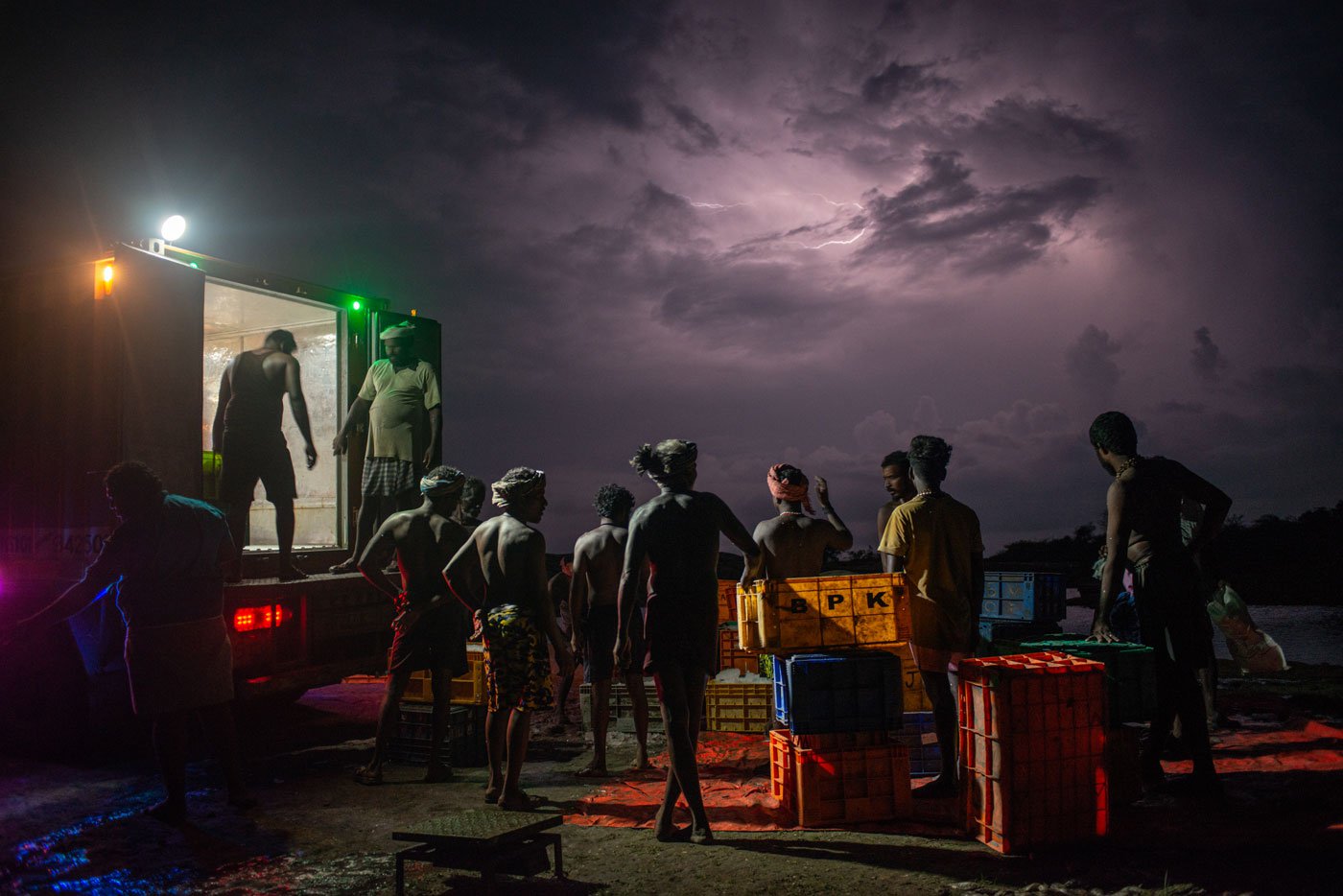
Ice boxes filled with catch being loaded into the truck in Kunnathur to be taken to the market
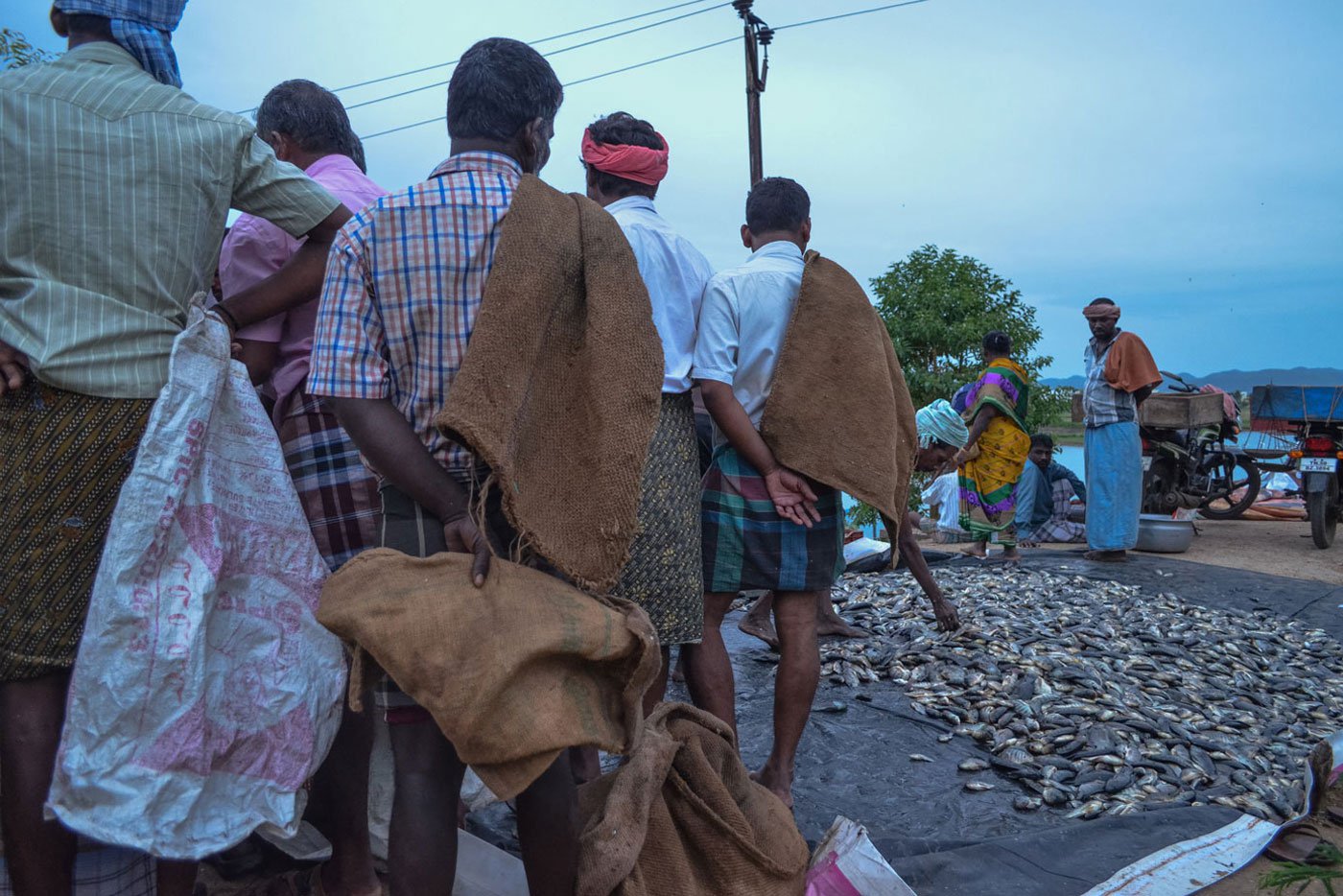
Local merchants waiting with their gunny bags to buy directly from the fishermen near the big lake in Jawaharlalpuram
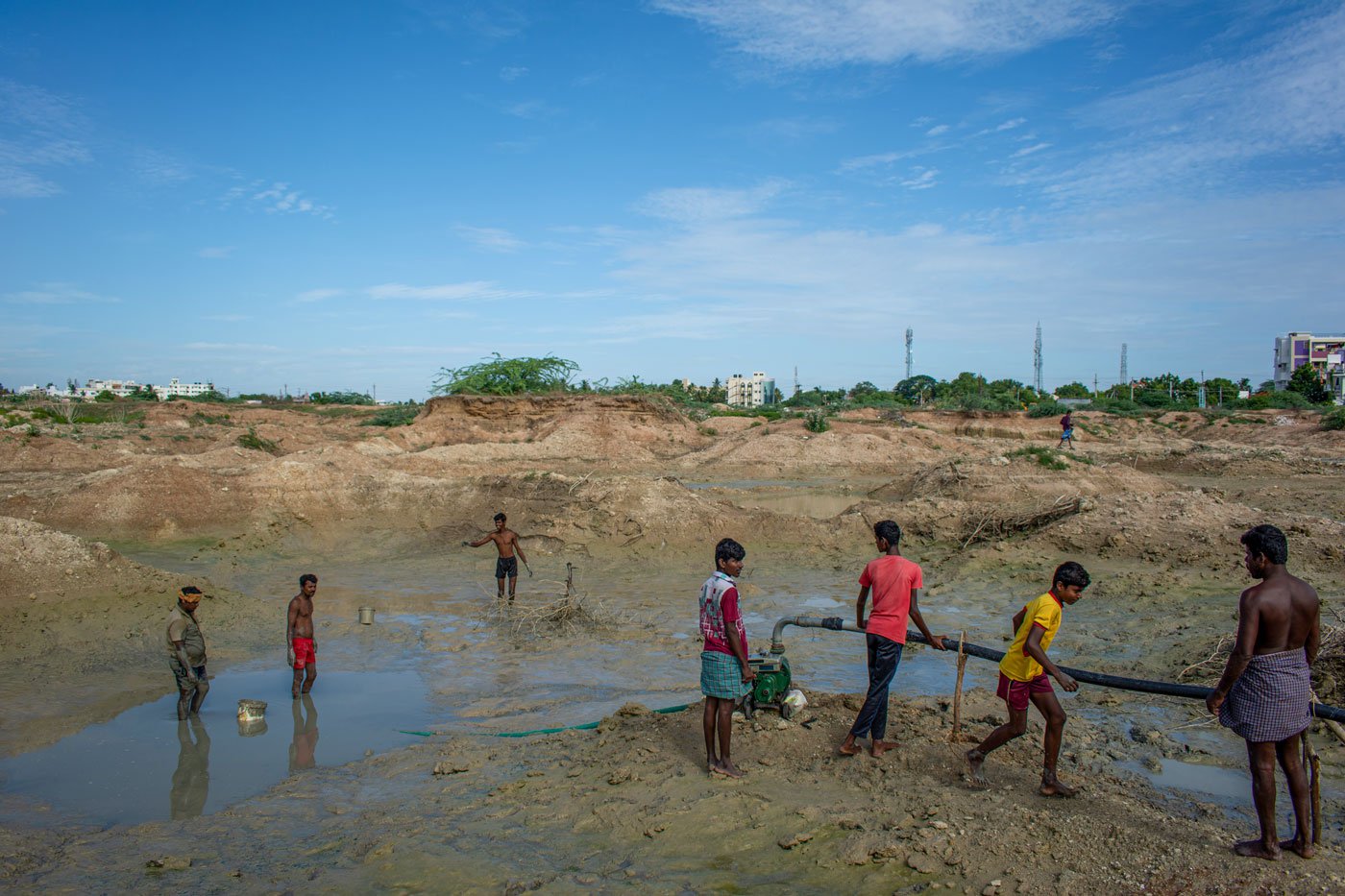
As the season comes to an end and water starts drying up, fishermen pump out water left in the lake to catch korava and veral varieties
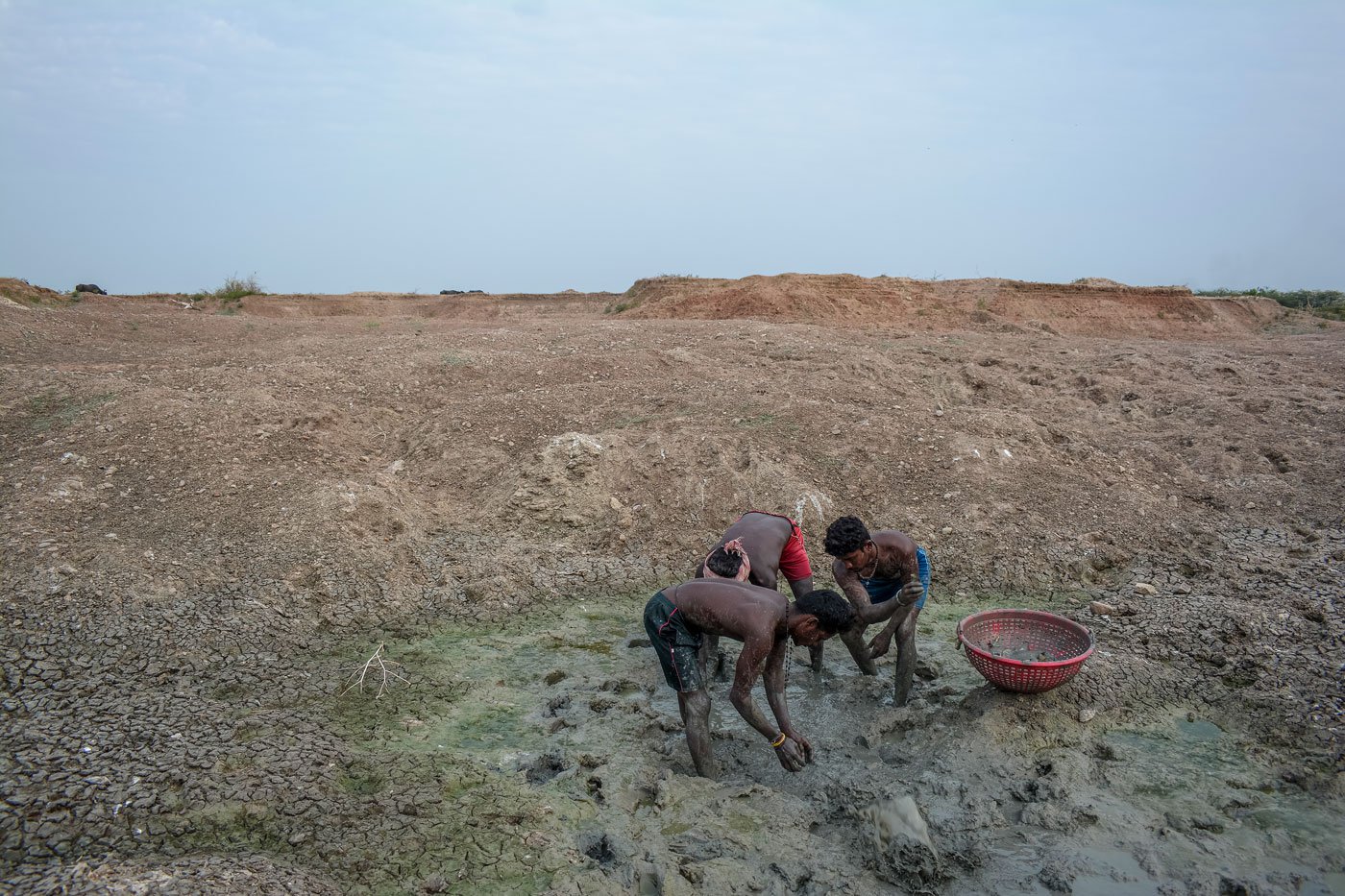
Even as water dries up in Kodikulam, this small lake still has some fish
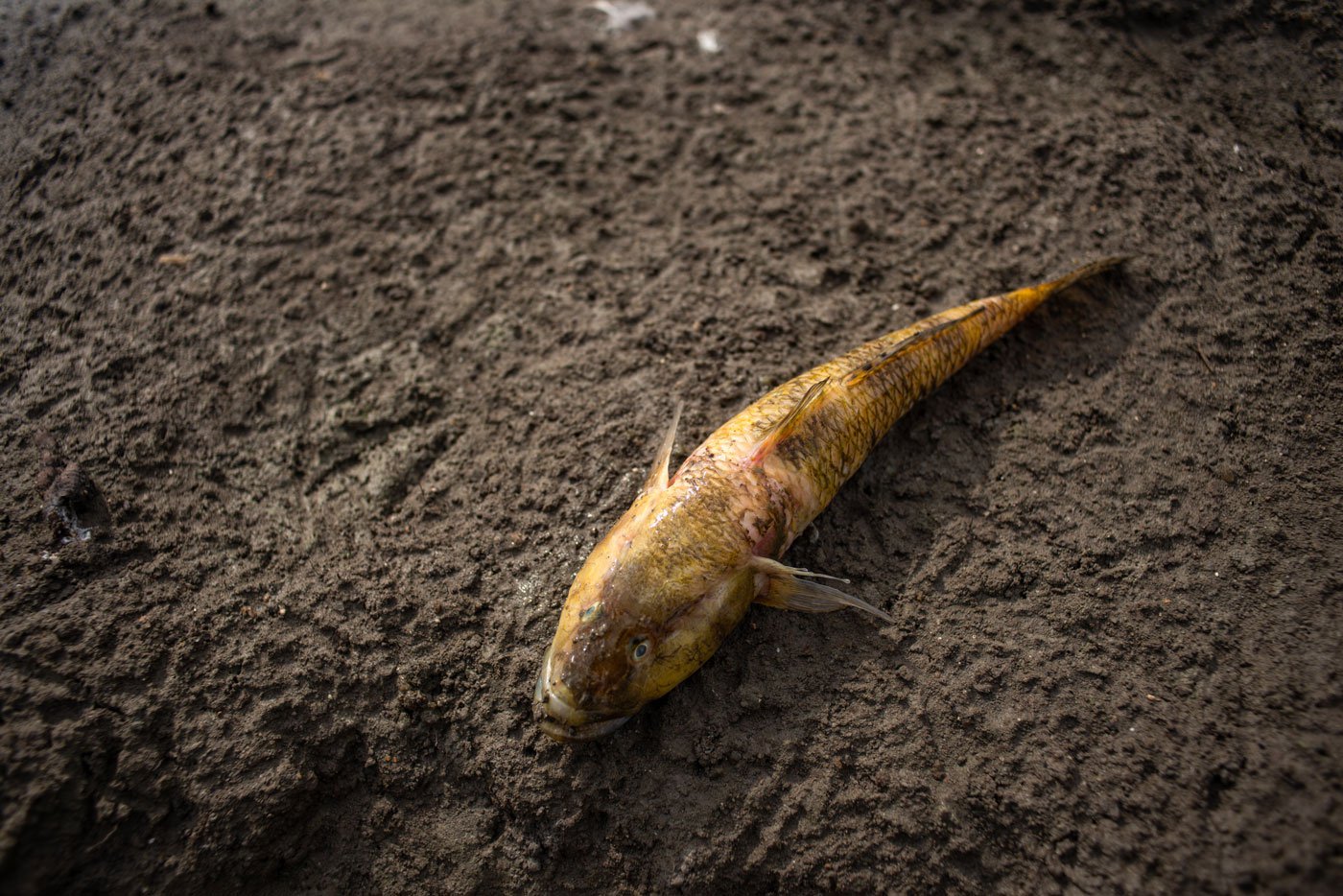
The native uluva is the most delicious variety found in Madurai
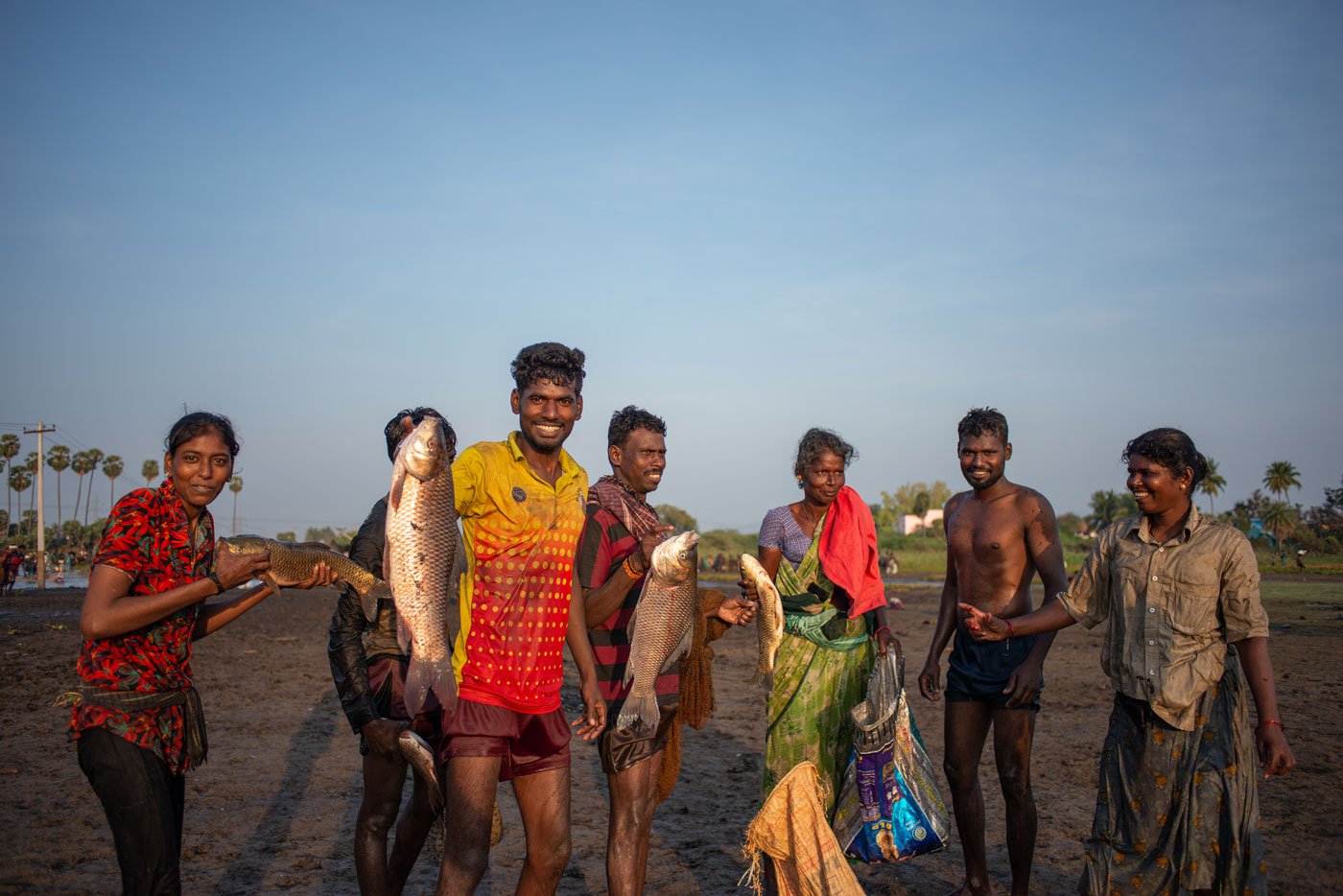
A family from Kallandhiri village show off their catch during the fish harvesting festival
